BLSS Research Ethics Application Form
VerifiedAdded on 2023/06/10
|22
|5898
|415
AI Summary
This is a BLSS Research Ethics Application Form for a study on Perception of Hidden Disability. The form includes details on the researcher, nature of the project, research methods, participant information, and potential risks. The study aims to gain understanding of perceptions of hidden disability and to identify and describe the discourses that are constructed as part of this process. The data will be collected through focus groups and analyzed using interpretive phenomenological analysis. Participants will be recruited through current networks, university and friends with hidden Disability or illness. The form also addresses potential risks to participants and the research team.
Contribute Materials
Your contribution can guide someone’s learning journey. Share your
documents today.
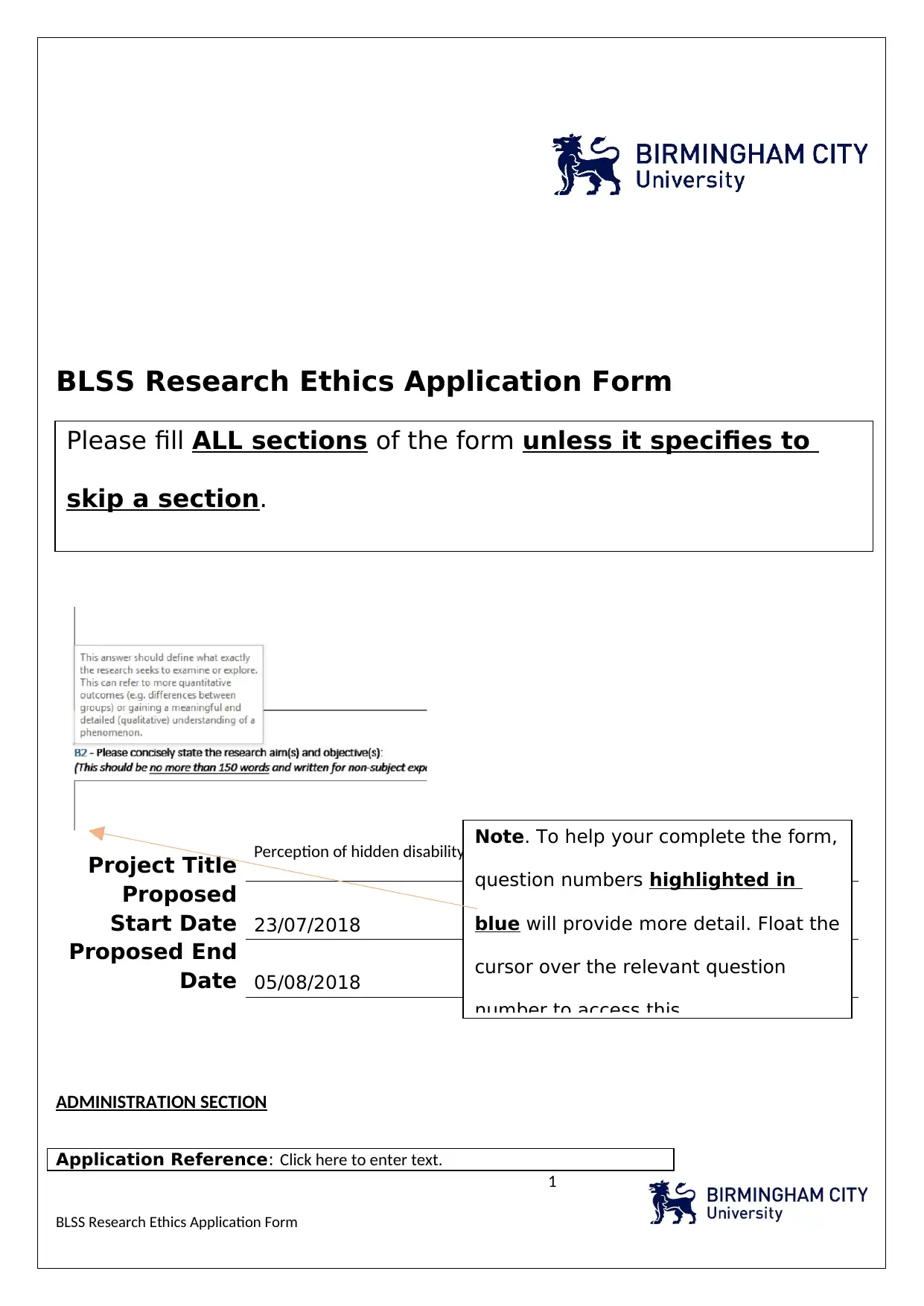
BLSS Research Ethics Application Form
Project Title Perception of hidden disability
Proposed
Start Date 23/07/2018
Proposed End
Date 05/08/2018
ADMINISTRATION SECTION
Application Reference: Click here to enter text.
1
BLSS Research Ethics Application Form
Please fill ALL sections of the form unless it specifies to
skip a section.
Note. To help your complete the form,
question numbers highlighted in
blue will provide more detail. Float the
cursor over the relevant question
number to access this.
Project Title Perception of hidden disability
Proposed
Start Date 23/07/2018
Proposed End
Date 05/08/2018
ADMINISTRATION SECTION
Application Reference: Click here to enter text.
1
BLSS Research Ethics Application Form
Please fill ALL sections of the form unless it specifies to
skip a section.
Note. To help your complete the form,
question numbers highlighted in
blue will provide more detail. Float the
cursor over the relevant question
number to access this.
Secure Best Marks with AI Grader
Need help grading? Try our AI Grader for instant feedback on your assignments.
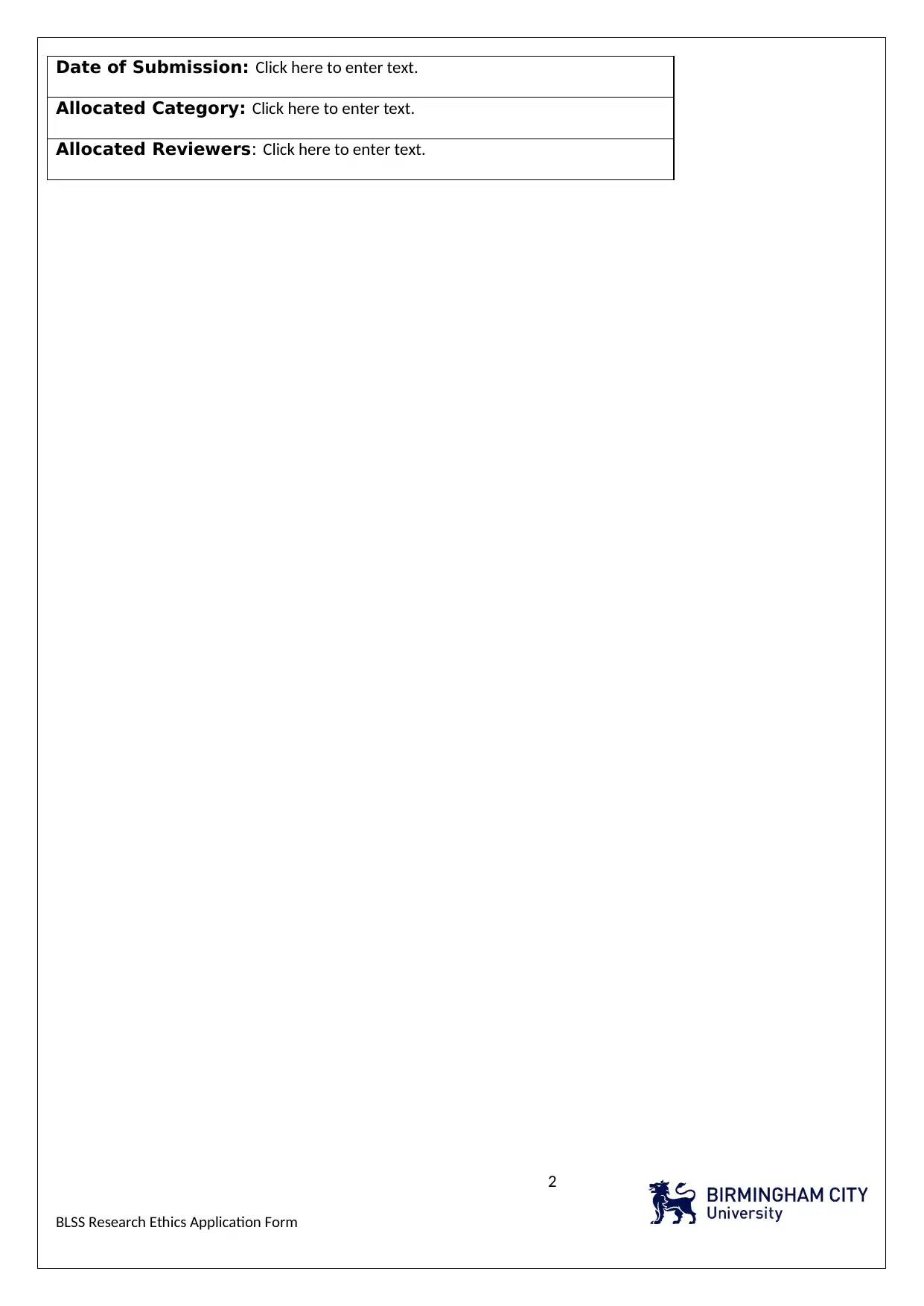
Date of Submission: Click here to enter text.
Allocated Category: Click here to enter text.
Allocated Reviewers: Click here to enter text.
2
BLSS Research Ethics Application Form
Allocated Category: Click here to enter text.
Allocated Reviewers: Click here to enter text.
2
BLSS Research Ethics Application Form
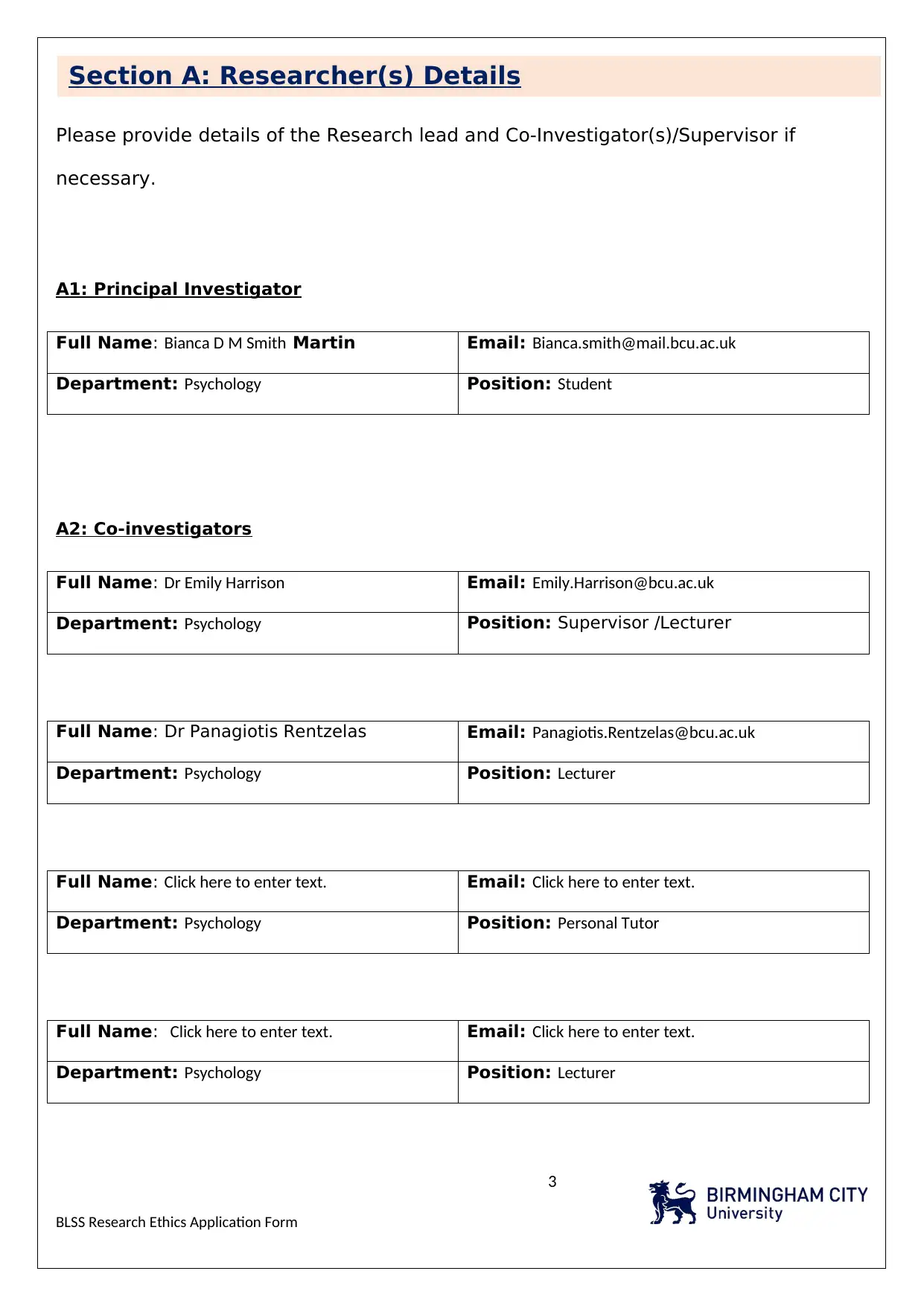
Please provide details of the Research lead and Co-Investigator(s)/Supervisor if
necessary.
A1: Principal Investigator
Full Name: Bianca D M Smith Martin Email: Bianca.smith@mail.bcu.ac.uk
Department: Psychology Position: Student
A2: Co-investigators
Full Name: Dr Emily Harrison Email: Emily.Harrison@bcu.ac.uk
Department: Psychology Position: Supervisor /Lecturer
Full Name: Dr Panagiotis Rentzelas Email: Panagiotis.Rentzelas@bcu.ac.uk
Department: Psychology Position: Lecturer
Full Name: Click here to enter text. Email: Click here to enter text.
Department: Psychology Position: Personal Tutor
Full Name: Click here to enter text. Email: Click here to enter text.
Department: Psychology Position: Lecturer
3
BLSS Research Ethics Application Form
Section A: Researcher(s) Details
necessary.
A1: Principal Investigator
Full Name: Bianca D M Smith Martin Email: Bianca.smith@mail.bcu.ac.uk
Department: Psychology Position: Student
A2: Co-investigators
Full Name: Dr Emily Harrison Email: Emily.Harrison@bcu.ac.uk
Department: Psychology Position: Supervisor /Lecturer
Full Name: Dr Panagiotis Rentzelas Email: Panagiotis.Rentzelas@bcu.ac.uk
Department: Psychology Position: Lecturer
Full Name: Click here to enter text. Email: Click here to enter text.
Department: Psychology Position: Personal Tutor
Full Name: Click here to enter text. Email: Click here to enter text.
Department: Psychology Position: Lecturer
3
BLSS Research Ethics Application Form
Section A: Researcher(s) Details

4
BLSS Research Ethics Application Form
BLSS Research Ethics Application Form
Secure Best Marks with AI Grader
Need help grading? Try our AI Grader for instant feedback on your assignments.
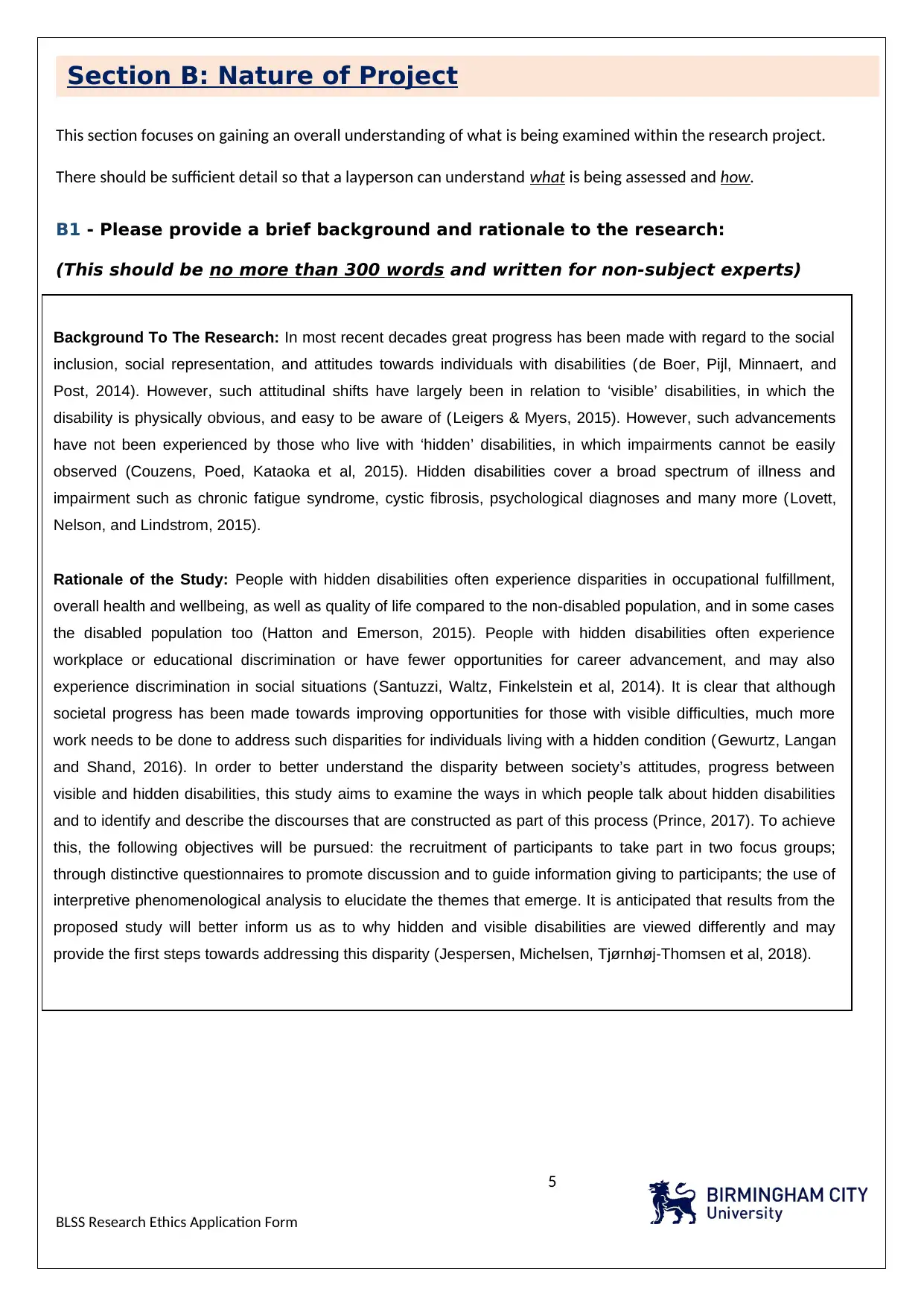
This section focuses on gaining an overall understanding of what is being examined within the research project.
There should be sufficient detail so that a layperson can understand what is being assessed and how.
B1 - Please provide a brief background and rationale to the research:
(This should be no more than 300 words and written for non-subject experts)
5
BLSS Research Ethics Application Form
Background To The Research: In most recent decades great progress has been made with regard to the social
inclusion, social representation, and attitudes towards individuals with disabilities (de Boer, Pijl, Minnaert, and
Post, 2014). However, such attitudinal shifts have largely been in relation to ‘visible’ disabilities, in which the
disability is physically obvious, and easy to be aware of (Leigers & Myers, 2015). However, such advancements
have not been experienced by those who live with ‘hidden’ disabilities, in which impairments cannot be easily
observed (Couzens, Poed, Kataoka et al, 2015). Hidden disabilities cover a broad spectrum of illness and
impairment such as chronic fatigue syndrome, cystic fibrosis, psychological diagnoses and many more (Lovett,
Nelson, and Lindstrom, 2015).
Rationale of the Study: People with hidden disabilities often experience disparities in occupational fulfillment,
overall health and wellbeing, as well as quality of life compared to the non-disabled population, and in some cases
the disabled population too (Hatton and Emerson, 2015). People with hidden disabilities often experience
workplace or educational discrimination or have fewer opportunities for career advancement, and may also
experience discrimination in social situations (Santuzzi, Waltz, Finkelstein et al, 2014). It is clear that although
societal progress has been made towards improving opportunities for those with visible difficulties, much more
work needs to be done to address such disparities for individuals living with a hidden condition (Gewurtz, Langan
and Shand, 2016). In order to better understand the disparity between society’s attitudes, progress between
visible and hidden disabilities, this study aims to examine the ways in which people talk about hidden disabilities
and to identify and describe the discourses that are constructed as part of this process (Prince, 2017). To achieve
this, the following objectives will be pursued: the recruitment of participants to take part in two focus groups;
through distinctive questionnaires to promote discussion and to guide information giving to participants; the use of
interpretive phenomenological analysis to elucidate the themes that emerge. It is anticipated that results from the
proposed study will better inform us as to why hidden and visible disabilities are viewed differently and may
provide the first steps towards addressing this disparity (Jespersen, Michelsen, Tjørnhøj-Thomsen et al, 2018).
Section B: Nature of Project
There should be sufficient detail so that a layperson can understand what is being assessed and how.
B1 - Please provide a brief background and rationale to the research:
(This should be no more than 300 words and written for non-subject experts)
5
BLSS Research Ethics Application Form
Background To The Research: In most recent decades great progress has been made with regard to the social
inclusion, social representation, and attitudes towards individuals with disabilities (de Boer, Pijl, Minnaert, and
Post, 2014). However, such attitudinal shifts have largely been in relation to ‘visible’ disabilities, in which the
disability is physically obvious, and easy to be aware of (Leigers & Myers, 2015). However, such advancements
have not been experienced by those who live with ‘hidden’ disabilities, in which impairments cannot be easily
observed (Couzens, Poed, Kataoka et al, 2015). Hidden disabilities cover a broad spectrum of illness and
impairment such as chronic fatigue syndrome, cystic fibrosis, psychological diagnoses and many more (Lovett,
Nelson, and Lindstrom, 2015).
Rationale of the Study: People with hidden disabilities often experience disparities in occupational fulfillment,
overall health and wellbeing, as well as quality of life compared to the non-disabled population, and in some cases
the disabled population too (Hatton and Emerson, 2015). People with hidden disabilities often experience
workplace or educational discrimination or have fewer opportunities for career advancement, and may also
experience discrimination in social situations (Santuzzi, Waltz, Finkelstein et al, 2014). It is clear that although
societal progress has been made towards improving opportunities for those with visible difficulties, much more
work needs to be done to address such disparities for individuals living with a hidden condition (Gewurtz, Langan
and Shand, 2016). In order to better understand the disparity between society’s attitudes, progress between
visible and hidden disabilities, this study aims to examine the ways in which people talk about hidden disabilities
and to identify and describe the discourses that are constructed as part of this process (Prince, 2017). To achieve
this, the following objectives will be pursued: the recruitment of participants to take part in two focus groups;
through distinctive questionnaires to promote discussion and to guide information giving to participants; the use of
interpretive phenomenological analysis to elucidate the themes that emerge. It is anticipated that results from the
proposed study will better inform us as to why hidden and visible disabilities are viewed differently and may
provide the first steps towards addressing this disparity (Jespersen, Michelsen, Tjørnhøj-Thomsen et al, 2018).
Section B: Nature of Project
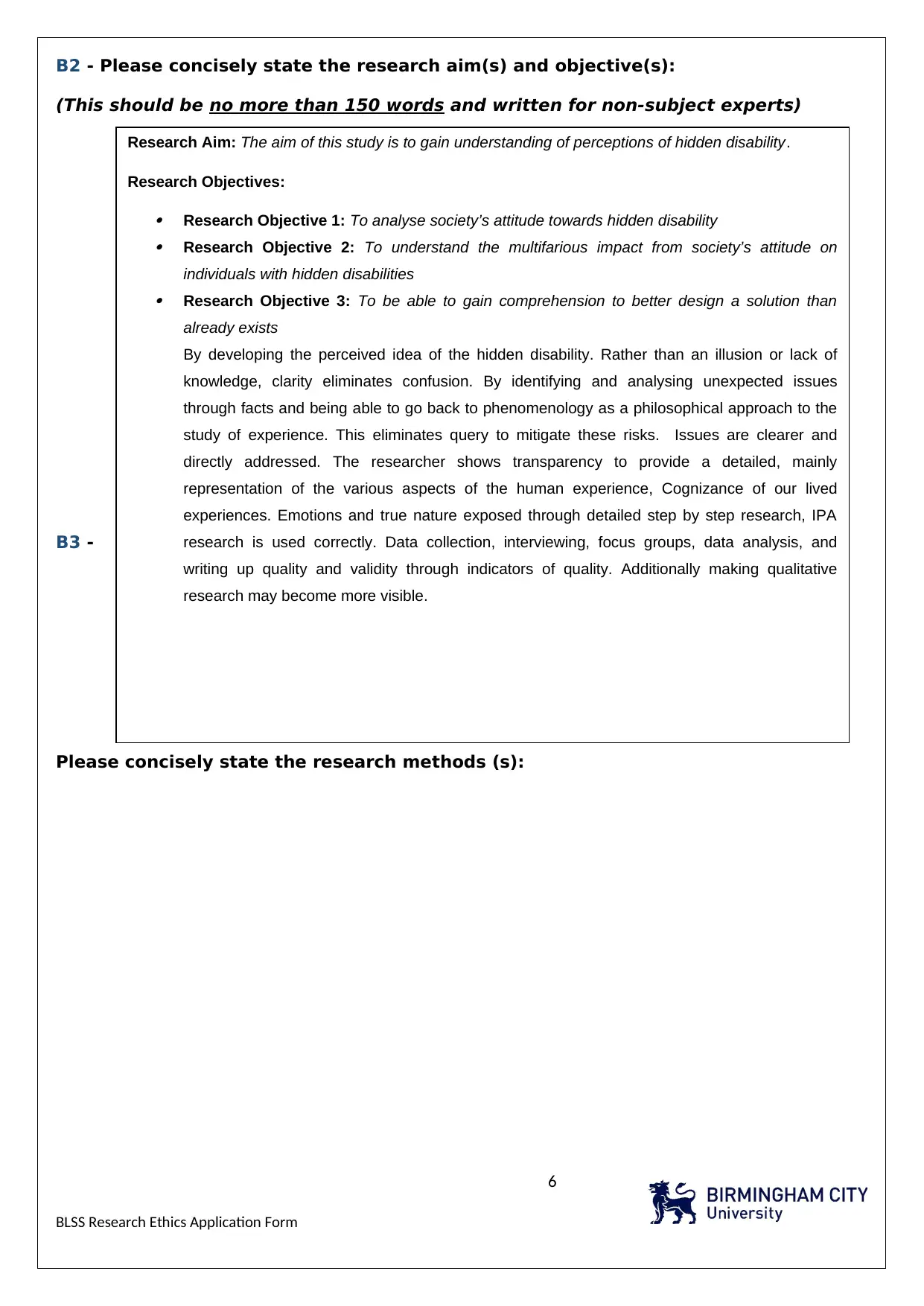
B2 - Please concisely state the research aim(s) and objective(s):
(This should be no more than 150 words and written for non-subject experts)
B3 -
Please concisely state the research methods (s):
6
BLSS Research Ethics Application Form
Research Aim: The aim of this study is to gain understanding of perceptions of hidden disability.
Research Objectives: Research Objective 1: To analyse society’s attitude towards hidden disability
Research Objective 2: To understand the multifarious impact from society’s attitude on
individuals with hidden disabilities
Research Objective 3: To be able to gain comprehension to better design a solution than
already exists
By developing the perceived idea of the hidden disability. Rather than an illusion or lack of
knowledge, clarity eliminates confusion. By identifying and analysing unexpected issues
through facts and being able to go back to phenomenology as a philosophical approach to the
study of experience. This eliminates query to mitigate these risks. Issues are clearer and
directly addressed. The researcher shows transparency to provide a detailed, mainly
representation of the various aspects of the human experience, Cognizance of our lived
experiences. Emotions and true nature exposed through detailed step by step research, IPA
research is used correctly. Data collection, interviewing, focus groups, data analysis, and
writing up quality and validity through indicators of quality. Additionally making qualitative
research may become more visible.
(This should be no more than 150 words and written for non-subject experts)
B3 -
Please concisely state the research methods (s):
6
BLSS Research Ethics Application Form
Research Aim: The aim of this study is to gain understanding of perceptions of hidden disability.
Research Objectives: Research Objective 1: To analyse society’s attitude towards hidden disability
Research Objective 2: To understand the multifarious impact from society’s attitude on
individuals with hidden disabilities
Research Objective 3: To be able to gain comprehension to better design a solution than
already exists
By developing the perceived idea of the hidden disability. Rather than an illusion or lack of
knowledge, clarity eliminates confusion. By identifying and analysing unexpected issues
through facts and being able to go back to phenomenology as a philosophical approach to the
study of experience. This eliminates query to mitigate these risks. Issues are clearer and
directly addressed. The researcher shows transparency to provide a detailed, mainly
representation of the various aspects of the human experience, Cognizance of our lived
experiences. Emotions and true nature exposed through detailed step by step research, IPA
research is used correctly. Data collection, interviewing, focus groups, data analysis, and
writing up quality and validity through indicators of quality. Additionally making qualitative
research may become more visible.

7
BLSS Research Ethics Application Form
BLSS Research Ethics Application Form
Paraphrase This Document
Need a fresh take? Get an instant paraphrase of this document with our AI Paraphraser
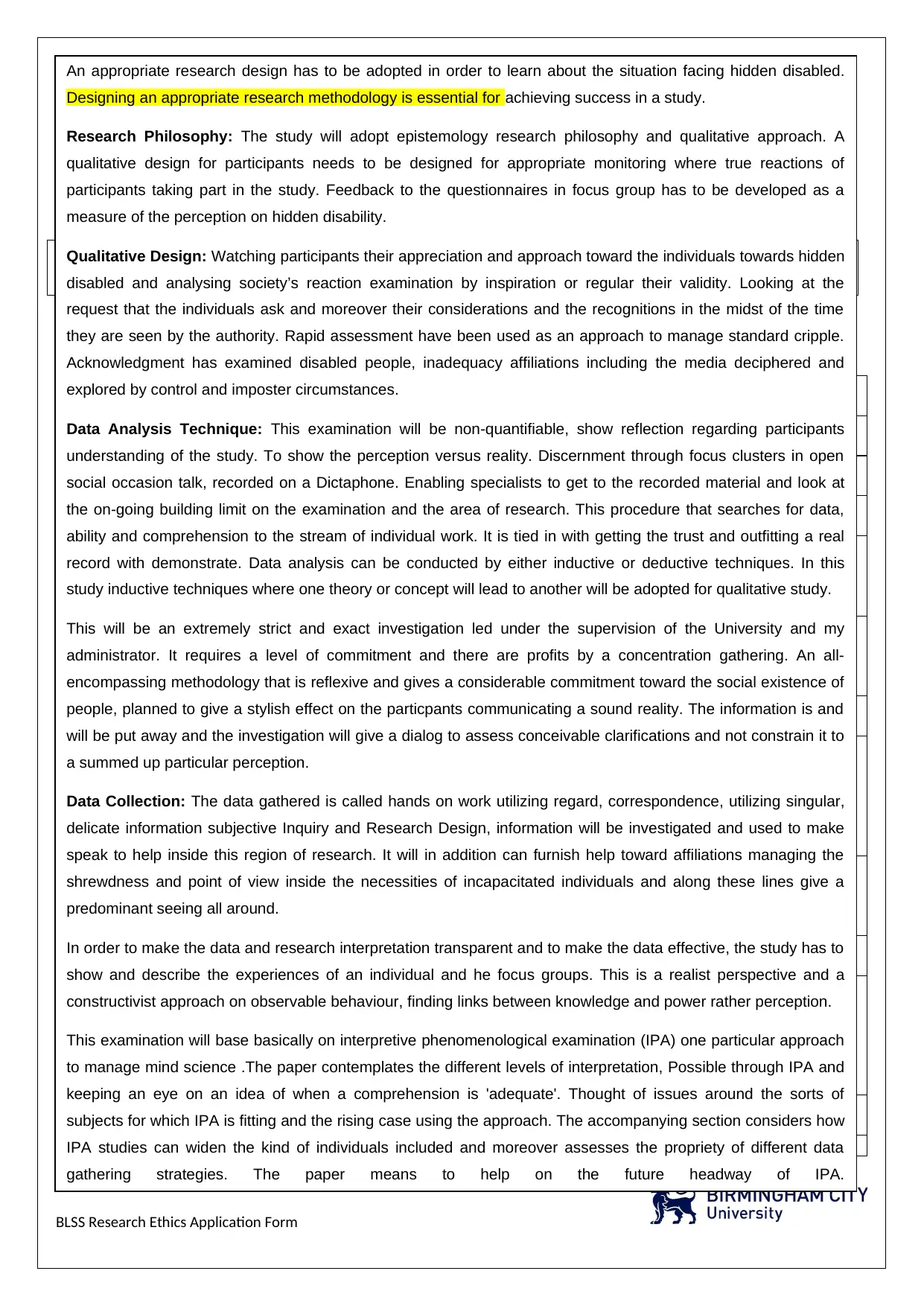
- (This should be no more than 500 words and written for non-subject experts)
B4 - Does this research require external ethical clearance (i.e. NOMS, NHS or DBS
check)? If so, please indicate if this has been attained or when this will be
attained.
I do not need a current DBS as the participants will all be over the age of 18 , University students and friends who
are experiencing a form of hidden Disability or illness
B5 – Does your research involve any of the following? If so, specific considerations
for these need to be addressed in sections C & D:
Participation of those under 18 years of age ☐
Participation of those with learning disability ☐
Participation of those with a mental health condition ☐
Participation of those with physical or sensory impairments ☐
Participation of those with sensitive/significant life experiences
(e.g. victims of abuse / ex-offenders)
☒
Data collection surrounding highly sensitive topics
(e.g. abuse, terrorism, religion, interpersonal violence, terminal illness)
☒
Data collection from those in prison ☐
Constraint of participant rights
(e.g. informed consent via deception, or perceptions of the right to withdraw from the
study)
☐
Any physical or intrusive intervention with the participant
(Including consumption of food or drinks)
☐
Withholding any aspects of routine health treatment or care ☐
A reasonable risk of disclosure of information requiring communication to another
organisation
(e.g. abuse, criminal offences/illegal activity, unknown illness or disease)
☐
Long distance travel to collect data ☐
NHS service users ☒
8
BLSS Research Ethics Application Form
An appropriate research design has to be adopted in order to learn about the situation facing hidden disabled.
Designing an appropriate research methodology is essential for achieving success in a study.
Research Philosophy: The study will adopt epistemology research philosophy and qualitative approach. A
qualitative design for participants needs to be designed for appropriate monitoring where true reactions of
participants taking part in the study. Feedback to the questionnaires in focus group has to be developed as a
measure of the perception on hidden disability.
Qualitative Design: Watching participants their appreciation and approach toward the individuals towards hidden
disabled and analysing society’s reaction examination by inspiration or regular their validity. Looking at the
request that the individuals ask and moreover their considerations and the recognitions in the midst of the time
they are seen by the authority. Rapid assessment have been used as an approach to manage standard cripple.
Acknowledgment has examined disabled people, inadequacy affiliations including the media deciphered and
explored by control and imposter circumstances.
Data Analysis Technique: This examination will be non-quantifiable, show reflection regarding participants
understanding of the study. To show the perception versus reality. Discernment through focus clusters in open
social occasion talk, recorded on a Dictaphone. Enabling specialists to get to the recorded material and look at
the on-going building limit on the examination and the area of research. This procedure that searches for data,
ability and comprehension to the stream of individual work. It is tied in with getting the trust and outfitting a real
record with demonstrate. Data analysis can be conducted by either inductive or deductive techniques. In this
study inductive techniques where one theory or concept will lead to another will be adopted for qualitative study.
This will be an extremely strict and exact investigation led under the supervision of the University and my
administrator. It requires a level of commitment and there are profits by a concentration gathering. An all-
encompassing methodology that is reflexive and gives a considerable commitment toward the social existence of
people, planned to give a stylish effect on the particpants communicating a sound reality. The information is and
will be put away and the investigation will give a dialog to assess conceivable clarifications and not constrain it to
a summed up particular perception.
Data Collection: The data gathered is called hands on work utilizing regard, correspondence, utilizing singular,
delicate information subjective Inquiry and Research Design, information will be investigated and used to make
speak to help inside this region of research. It will in addition can furnish help toward affiliations managing the
shrewdness and point of view inside the necessities of incapacitated individuals and along these lines give a
predominant seeing all around.
In order to make the data and research interpretation transparent and to make the data effective, the study has to
show and describe the experiences of an individual and he focus groups. This is a realist perspective and a
constructivist approach on observable behaviour, finding links between knowledge and power rather perception.
This examination will base basically on interpretive phenomenological examination (IPA) one particular approach
to manage mind science .The paper contemplates the different levels of interpretation, Possible through IPA and
keeping an eye on an idea of when a comprehension is 'adequate'. Thought of issues around the sorts of
subjects for which IPA is fitting and the rising case using the approach. The accompanying section considers how
IPA studies can widen the kind of individuals included and moreover assesses the propriety of different data
gathering strategies. The paper means to help on the future headway of IPA.
B4 - Does this research require external ethical clearance (i.e. NOMS, NHS or DBS
check)? If so, please indicate if this has been attained or when this will be
attained.
I do not need a current DBS as the participants will all be over the age of 18 , University students and friends who
are experiencing a form of hidden Disability or illness
B5 – Does your research involve any of the following? If so, specific considerations
for these need to be addressed in sections C & D:
Participation of those under 18 years of age ☐
Participation of those with learning disability ☐
Participation of those with a mental health condition ☐
Participation of those with physical or sensory impairments ☐
Participation of those with sensitive/significant life experiences
(e.g. victims of abuse / ex-offenders)
☒
Data collection surrounding highly sensitive topics
(e.g. abuse, terrorism, religion, interpersonal violence, terminal illness)
☒
Data collection from those in prison ☐
Constraint of participant rights
(e.g. informed consent via deception, or perceptions of the right to withdraw from the
study)
☐
Any physical or intrusive intervention with the participant
(Including consumption of food or drinks)
☐
Withholding any aspects of routine health treatment or care ☐
A reasonable risk of disclosure of information requiring communication to another
organisation
(e.g. abuse, criminal offences/illegal activity, unknown illness or disease)
☐
Long distance travel to collect data ☐
NHS service users ☒
8
BLSS Research Ethics Application Form
An appropriate research design has to be adopted in order to learn about the situation facing hidden disabled.
Designing an appropriate research methodology is essential for achieving success in a study.
Research Philosophy: The study will adopt epistemology research philosophy and qualitative approach. A
qualitative design for participants needs to be designed for appropriate monitoring where true reactions of
participants taking part in the study. Feedback to the questionnaires in focus group has to be developed as a
measure of the perception on hidden disability.
Qualitative Design: Watching participants their appreciation and approach toward the individuals towards hidden
disabled and analysing society’s reaction examination by inspiration or regular their validity. Looking at the
request that the individuals ask and moreover their considerations and the recognitions in the midst of the time
they are seen by the authority. Rapid assessment have been used as an approach to manage standard cripple.
Acknowledgment has examined disabled people, inadequacy affiliations including the media deciphered and
explored by control and imposter circumstances.
Data Analysis Technique: This examination will be non-quantifiable, show reflection regarding participants
understanding of the study. To show the perception versus reality. Discernment through focus clusters in open
social occasion talk, recorded on a Dictaphone. Enabling specialists to get to the recorded material and look at
the on-going building limit on the examination and the area of research. This procedure that searches for data,
ability and comprehension to the stream of individual work. It is tied in with getting the trust and outfitting a real
record with demonstrate. Data analysis can be conducted by either inductive or deductive techniques. In this
study inductive techniques where one theory or concept will lead to another will be adopted for qualitative study.
This will be an extremely strict and exact investigation led under the supervision of the University and my
administrator. It requires a level of commitment and there are profits by a concentration gathering. An all-
encompassing methodology that is reflexive and gives a considerable commitment toward the social existence of
people, planned to give a stylish effect on the particpants communicating a sound reality. The information is and
will be put away and the investigation will give a dialog to assess conceivable clarifications and not constrain it to
a summed up particular perception.
Data Collection: The data gathered is called hands on work utilizing regard, correspondence, utilizing singular,
delicate information subjective Inquiry and Research Design, information will be investigated and used to make
speak to help inside this region of research. It will in addition can furnish help toward affiliations managing the
shrewdness and point of view inside the necessities of incapacitated individuals and along these lines give a
predominant seeing all around.
In order to make the data and research interpretation transparent and to make the data effective, the study has to
show and describe the experiences of an individual and he focus groups. This is a realist perspective and a
constructivist approach on observable behaviour, finding links between knowledge and power rather perception.
This examination will base basically on interpretive phenomenological examination (IPA) one particular approach
to manage mind science .The paper contemplates the different levels of interpretation, Possible through IPA and
keeping an eye on an idea of when a comprehension is 'adequate'. Thought of issues around the sorts of
subjects for which IPA is fitting and the rising case using the approach. The accompanying section considers how
IPA studies can widen the kind of individuals included and moreover assesses the propriety of different data
gathering strategies. The paper means to help on the future headway of IPA.
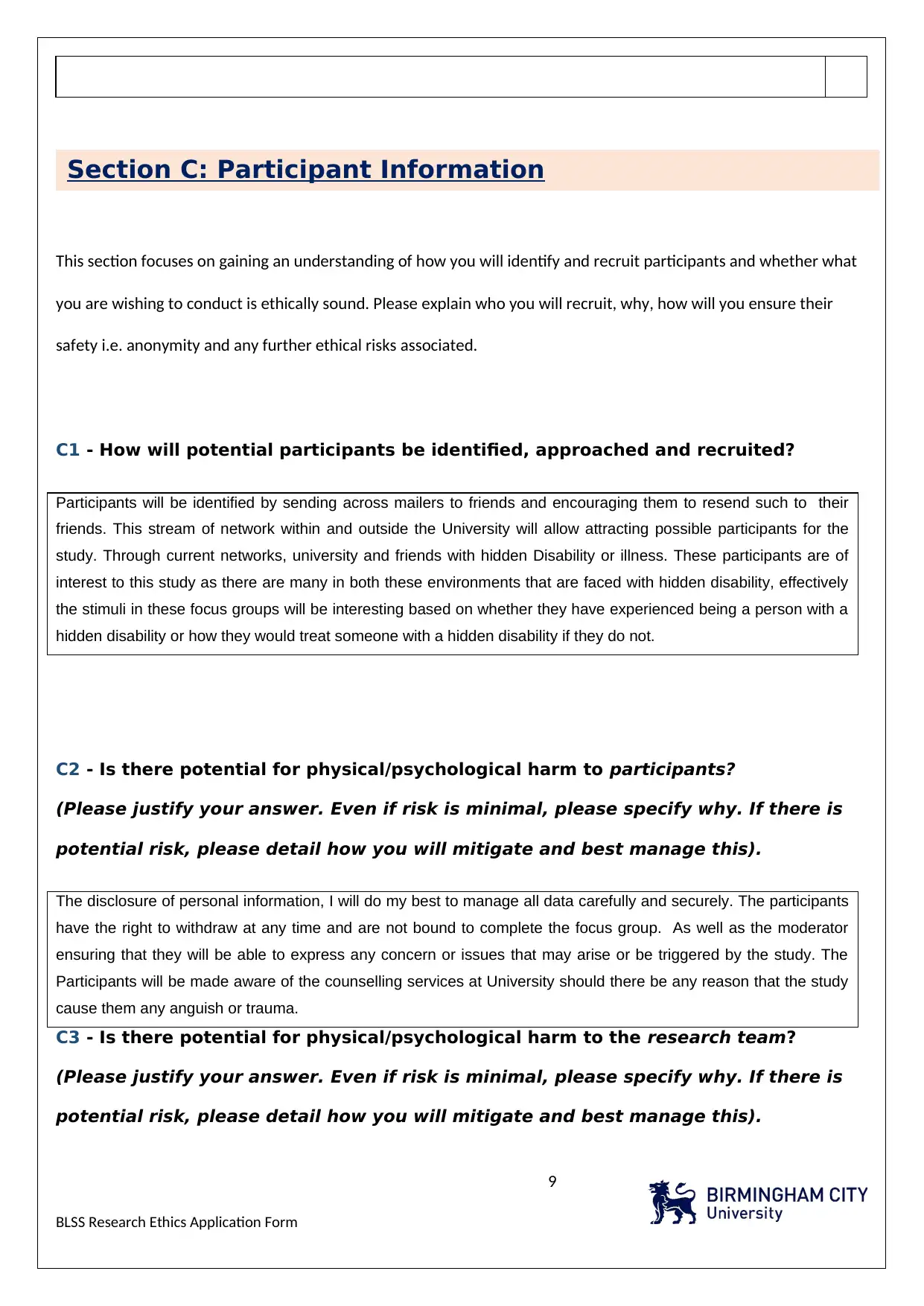
This section focuses on gaining an understanding of how you will identify and recruit participants and whether what
you are wishing to conduct is ethically sound. Please explain who you will recruit, why, how will you ensure their
safety i.e. anonymity and any further ethical risks associated.
C1 - How will potential participants be identified, approached and recruited?
Participants will be identified by sending across mailers to friends and encouraging them to resend such to their
friends. This stream of network within and outside the University will allow attracting possible participants for the
study. Through current networks, university and friends with hidden Disability or illness. These participants are of
interest to this study as there are many in both these environments that are faced with hidden disability, effectively
the stimuli in these focus groups will be interesting based on whether they have experienced being a person with a
hidden disability or how they would treat someone with a hidden disability if they do not.
C2 - Is there potential for physical/psychological harm to participants?
(Please justify your answer. Even if risk is minimal, please specify why. If there is
potential risk, please detail how you will mitigate and best manage this).
The disclosure of personal information, I will do my best to manage all data carefully and securely. The participants
have the right to withdraw at any time and are not bound to complete the focus group. As well as the moderator
ensuring that they will be able to express any concern or issues that may arise or be triggered by the study. The
Participants will be made aware of the counselling services at University should there be any reason that the study
cause them any anguish or trauma.
C3 - Is there potential for physical/psychological harm to the research team?
(Please justify your answer. Even if risk is minimal, please specify why. If there is
potential risk, please detail how you will mitigate and best manage this).
9
BLSS Research Ethics Application Form
Section C: Participant Information
you are wishing to conduct is ethically sound. Please explain who you will recruit, why, how will you ensure their
safety i.e. anonymity and any further ethical risks associated.
C1 - How will potential participants be identified, approached and recruited?
Participants will be identified by sending across mailers to friends and encouraging them to resend such to their
friends. This stream of network within and outside the University will allow attracting possible participants for the
study. Through current networks, university and friends with hidden Disability or illness. These participants are of
interest to this study as there are many in both these environments that are faced with hidden disability, effectively
the stimuli in these focus groups will be interesting based on whether they have experienced being a person with a
hidden disability or how they would treat someone with a hidden disability if they do not.
C2 - Is there potential for physical/psychological harm to participants?
(Please justify your answer. Even if risk is minimal, please specify why. If there is
potential risk, please detail how you will mitigate and best manage this).
The disclosure of personal information, I will do my best to manage all data carefully and securely. The participants
have the right to withdraw at any time and are not bound to complete the focus group. As well as the moderator
ensuring that they will be able to express any concern or issues that may arise or be triggered by the study. The
Participants will be made aware of the counselling services at University should there be any reason that the study
cause them any anguish or trauma.
C3 - Is there potential for physical/psychological harm to the research team?
(Please justify your answer. Even if risk is minimal, please specify why. If there is
potential risk, please detail how you will mitigate and best manage this).
9
BLSS Research Ethics Application Form
Section C: Participant Information
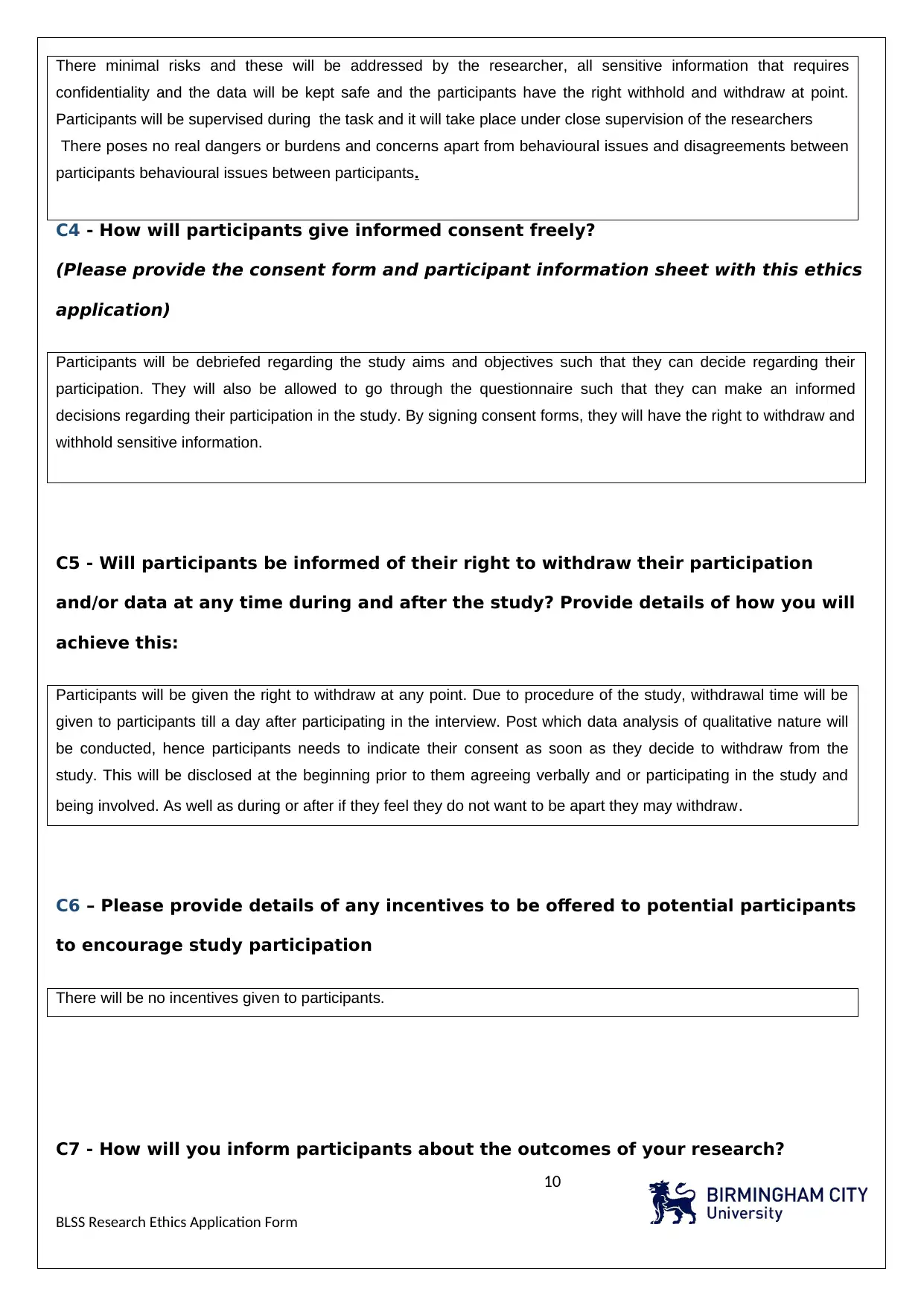
There minimal risks and these will be addressed by the researcher, all sensitive information that requires
confidentiality and the data will be kept safe and the participants have the right withhold and withdraw at point.
Participants will be supervised during the task and it will take place under close supervision of the researchers
There poses no real dangers or burdens and concerns apart from behavioural issues and disagreements between
participants behavioural issues between participants.
C4 - How will participants give informed consent freely?
(Please provide the consent form and participant information sheet with this ethics
application)
Participants will be debriefed regarding the study aims and objectives such that they can decide regarding their
participation. They will also be allowed to go through the questionnaire such that they can make an informed
decisions regarding their participation in the study. By signing consent forms, they will have the right to withdraw and
withhold sensitive information.
C5 - Will participants be informed of their right to withdraw their participation
and/or data at any time during and after the study? Provide details of how you will
achieve this:
Participants will be given the right to withdraw at any point. Due to procedure of the study, withdrawal time will be
given to participants till a day after participating in the interview. Post which data analysis of qualitative nature will
be conducted, hence participants needs to indicate their consent as soon as they decide to withdraw from the
study. This will be disclosed at the beginning prior to them agreeing verbally and or participating in the study and
being involved. As well as during or after if they feel they do not want to be apart they may withdraw.
C6 – Please provide details of any incentives to be offered to potential participants
to encourage study participation
There will be no incentives given to participants.
C7 - How will you inform participants about the outcomes of your research?
10
BLSS Research Ethics Application Form
confidentiality and the data will be kept safe and the participants have the right withhold and withdraw at point.
Participants will be supervised during the task and it will take place under close supervision of the researchers
There poses no real dangers or burdens and concerns apart from behavioural issues and disagreements between
participants behavioural issues between participants.
C4 - How will participants give informed consent freely?
(Please provide the consent form and participant information sheet with this ethics
application)
Participants will be debriefed regarding the study aims and objectives such that they can decide regarding their
participation. They will also be allowed to go through the questionnaire such that they can make an informed
decisions regarding their participation in the study. By signing consent forms, they will have the right to withdraw and
withhold sensitive information.
C5 - Will participants be informed of their right to withdraw their participation
and/or data at any time during and after the study? Provide details of how you will
achieve this:
Participants will be given the right to withdraw at any point. Due to procedure of the study, withdrawal time will be
given to participants till a day after participating in the interview. Post which data analysis of qualitative nature will
be conducted, hence participants needs to indicate their consent as soon as they decide to withdraw from the
study. This will be disclosed at the beginning prior to them agreeing verbally and or participating in the study and
being involved. As well as during or after if they feel they do not want to be apart they may withdraw.
C6 – Please provide details of any incentives to be offered to potential participants
to encourage study participation
There will be no incentives given to participants.
C7 - How will you inform participants about the outcomes of your research?
10
BLSS Research Ethics Application Form
Secure Best Marks with AI Grader
Need help grading? Try our AI Grader for instant feedback on your assignments.
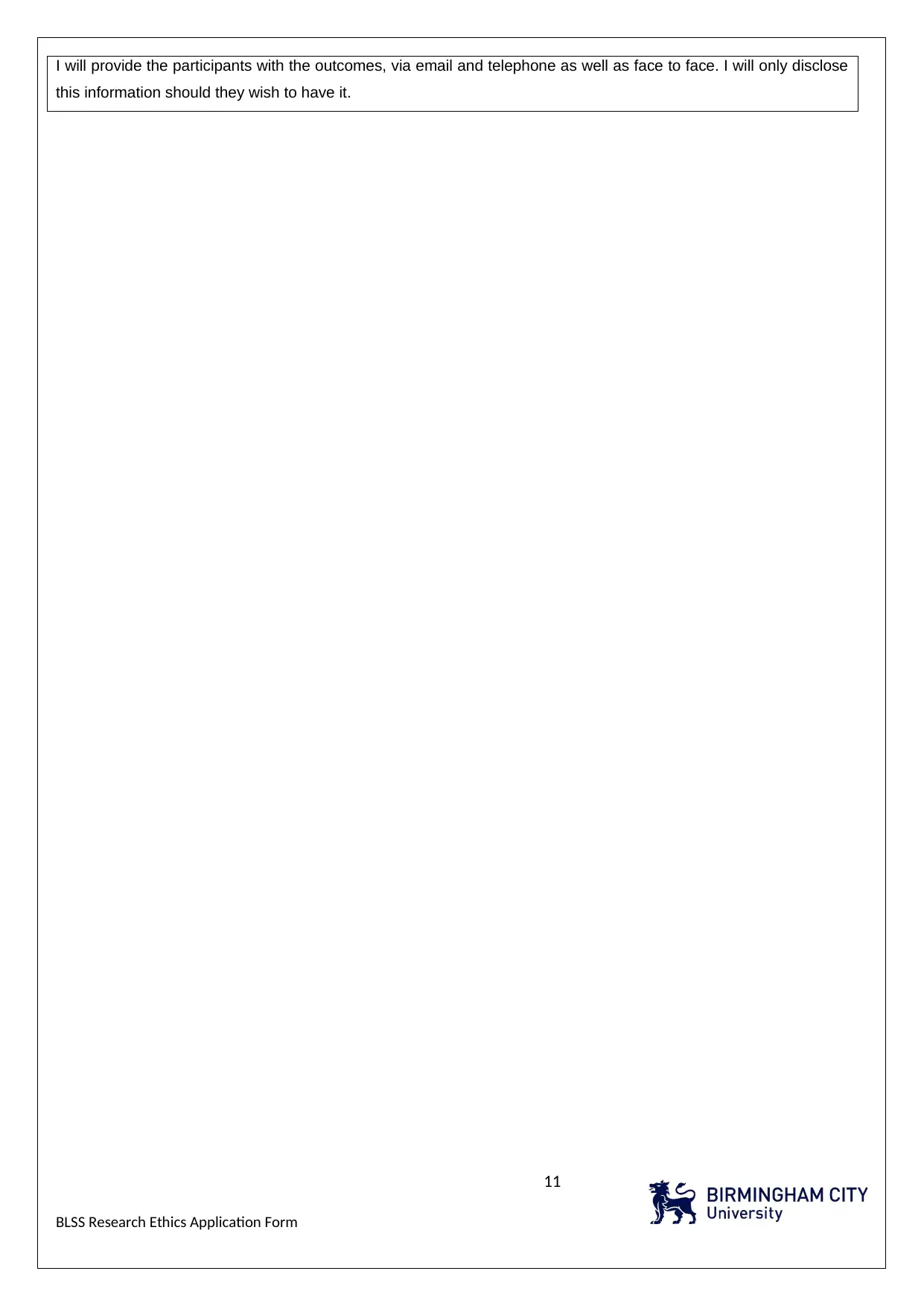
I will provide the participants with the outcomes, via email and telephone as well as face to face. I will only disclose
this information should they wish to have it.
11
BLSS Research Ethics Application Form
this information should they wish to have it.
11
BLSS Research Ethics Application Form
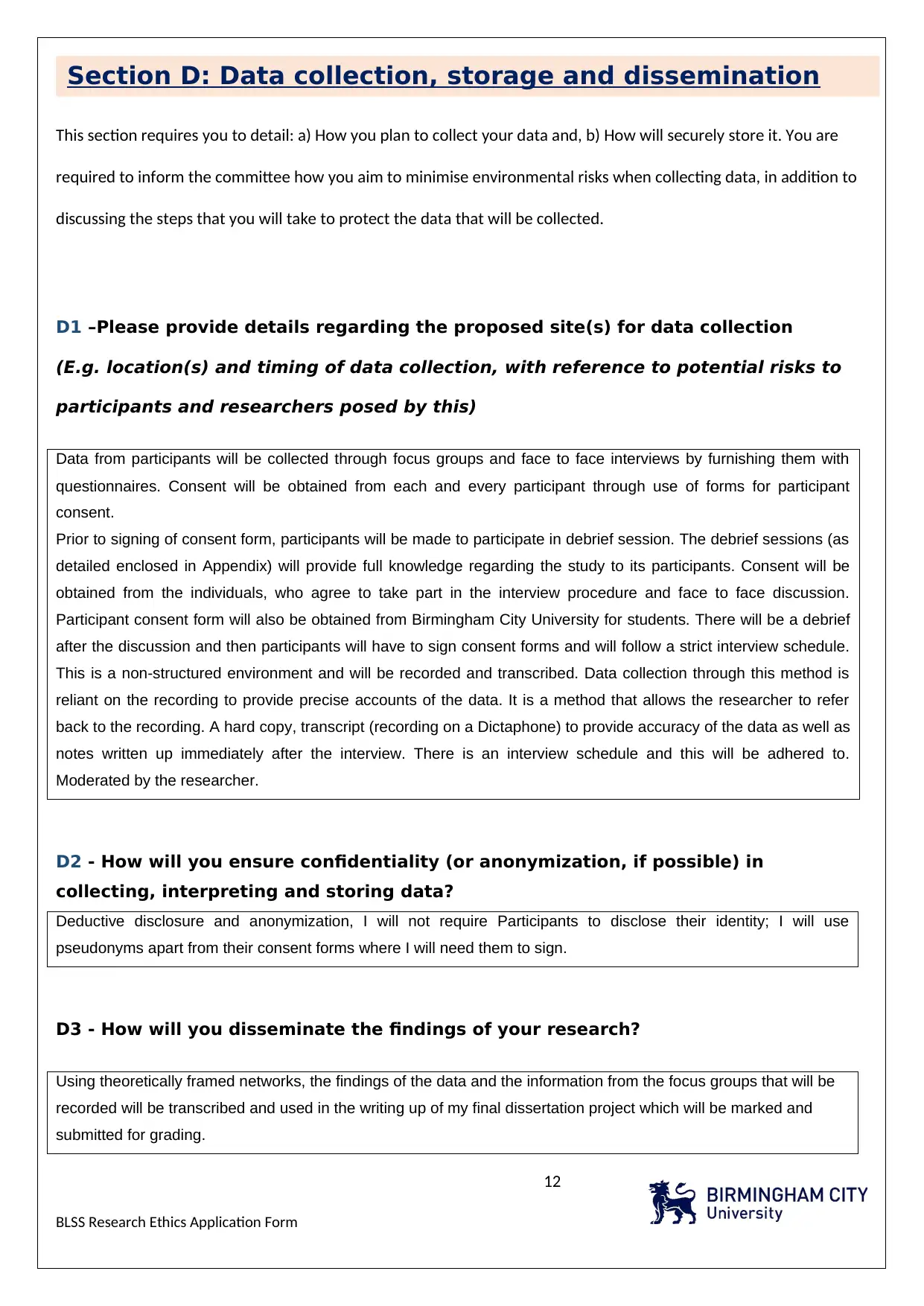
This section requires you to detail: a) How you plan to collect your data and, b) How will securely store it. You are
required to inform the committee how you aim to minimise environmental risks when collecting data, in addition to
discussing the steps that you will take to protect the data that will be collected.
D1 –Please provide details regarding the proposed site(s) for data collection
(E.g. location(s) and timing of data collection, with reference to potential risks to
participants and researchers posed by this)
Data from participants will be collected through focus groups and face to face interviews by furnishing them with
questionnaires. Consent will be obtained from each and every participant through use of forms for participant
consent.
Prior to signing of consent form, participants will be made to participate in debrief session. The debrief sessions (as
detailed enclosed in Appendix) will provide full knowledge regarding the study to its participants. Consent will be
obtained from the individuals, who agree to take part in the interview procedure and face to face discussion.
Participant consent form will also be obtained from Birmingham City University for students. There will be a debrief
after the discussion and then participants will have to sign consent forms and will follow a strict interview schedule.
This is a non-structured environment and will be recorded and transcribed. Data collection through this method is
reliant on the recording to provide precise accounts of the data. It is a method that allows the researcher to refer
back to the recording. A hard copy, transcript (recording on a Dictaphone) to provide accuracy of the data as well as
notes written up immediately after the interview. There is an interview schedule and this will be adhered to.
Moderated by the researcher.
D2 - How will you ensure confidentiality (or anonymization, if possible) in
collecting, interpreting and storing data?
Deductive disclosure and anonymization, I will not require Participants to disclose their identity; I will use
pseudonyms apart from their consent forms where I will need them to sign.
D3 - How will you disseminate the findings of your research?
Using theoretically framed networks, the findings of the data and the information from the focus groups that will be
recorded will be transcribed and used in the writing up of my final dissertation project which will be marked and
submitted for grading.
12
BLSS Research Ethics Application Form
Section D: Data collection, storage and dissemination
required to inform the committee how you aim to minimise environmental risks when collecting data, in addition to
discussing the steps that you will take to protect the data that will be collected.
D1 –Please provide details regarding the proposed site(s) for data collection
(E.g. location(s) and timing of data collection, with reference to potential risks to
participants and researchers posed by this)
Data from participants will be collected through focus groups and face to face interviews by furnishing them with
questionnaires. Consent will be obtained from each and every participant through use of forms for participant
consent.
Prior to signing of consent form, participants will be made to participate in debrief session. The debrief sessions (as
detailed enclosed in Appendix) will provide full knowledge regarding the study to its participants. Consent will be
obtained from the individuals, who agree to take part in the interview procedure and face to face discussion.
Participant consent form will also be obtained from Birmingham City University for students. There will be a debrief
after the discussion and then participants will have to sign consent forms and will follow a strict interview schedule.
This is a non-structured environment and will be recorded and transcribed. Data collection through this method is
reliant on the recording to provide precise accounts of the data. It is a method that allows the researcher to refer
back to the recording. A hard copy, transcript (recording on a Dictaphone) to provide accuracy of the data as well as
notes written up immediately after the interview. There is an interview schedule and this will be adhered to.
Moderated by the researcher.
D2 - How will you ensure confidentiality (or anonymization, if possible) in
collecting, interpreting and storing data?
Deductive disclosure and anonymization, I will not require Participants to disclose their identity; I will use
pseudonyms apart from their consent forms where I will need them to sign.
D3 - How will you disseminate the findings of your research?
Using theoretically framed networks, the findings of the data and the information from the focus groups that will be
recorded will be transcribed and used in the writing up of my final dissertation project which will be marked and
submitted for grading.
12
BLSS Research Ethics Application Form
Section D: Data collection, storage and dissemination
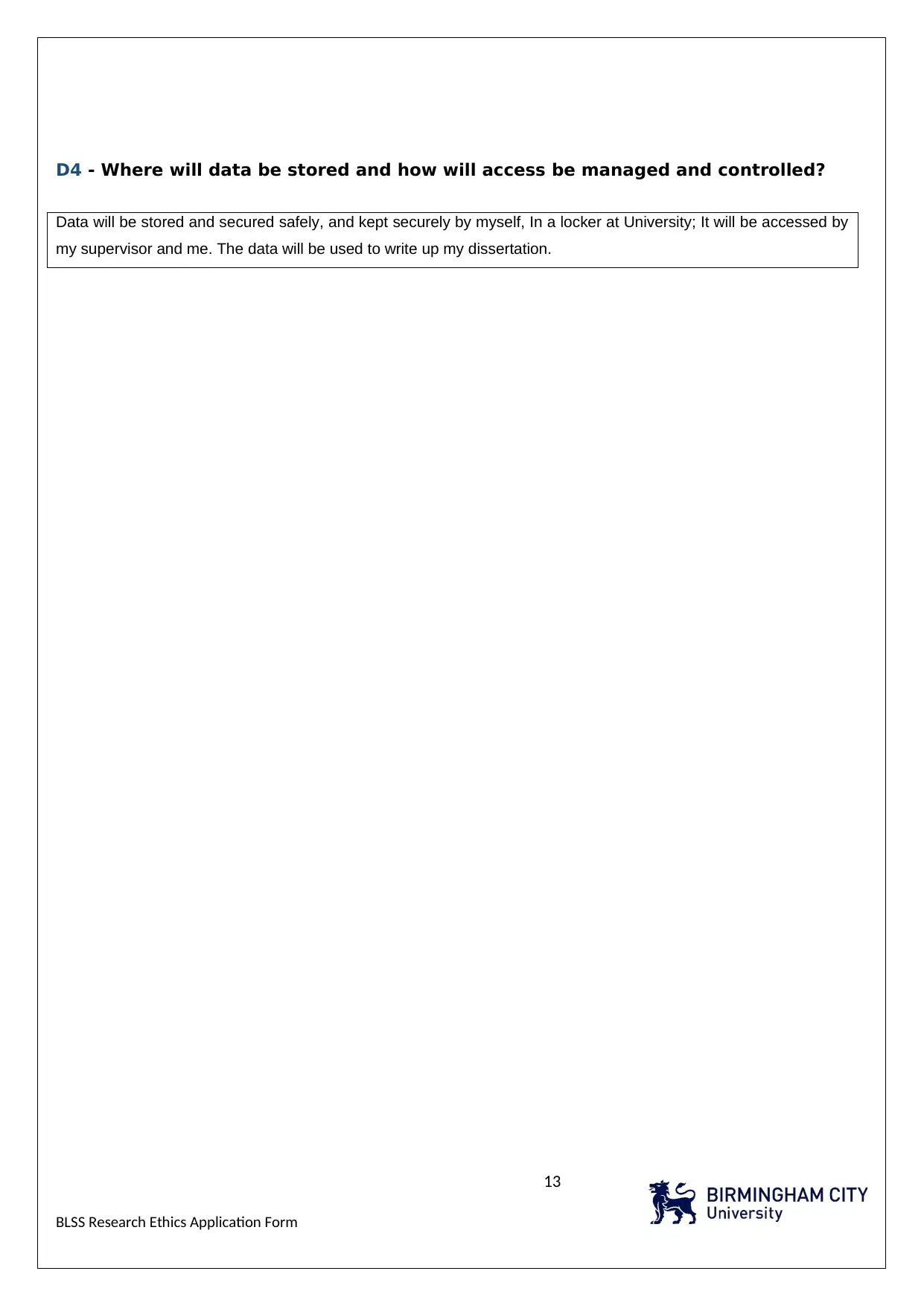
D4 - Where will data be stored and how will access be managed and controlled?
Data will be stored and secured safely, and kept securely by myself, In a locker at University; It will be accessed by
my supervisor and me. The data will be used to write up my dissertation.
13
BLSS Research Ethics Application Form
Data will be stored and secured safely, and kept securely by myself, In a locker at University; It will be accessed by
my supervisor and me. The data will be used to write up my dissertation.
13
BLSS Research Ethics Application Form
Paraphrase This Document
Need a fresh take? Get an instant paraphrase of this document with our AI Paraphraser
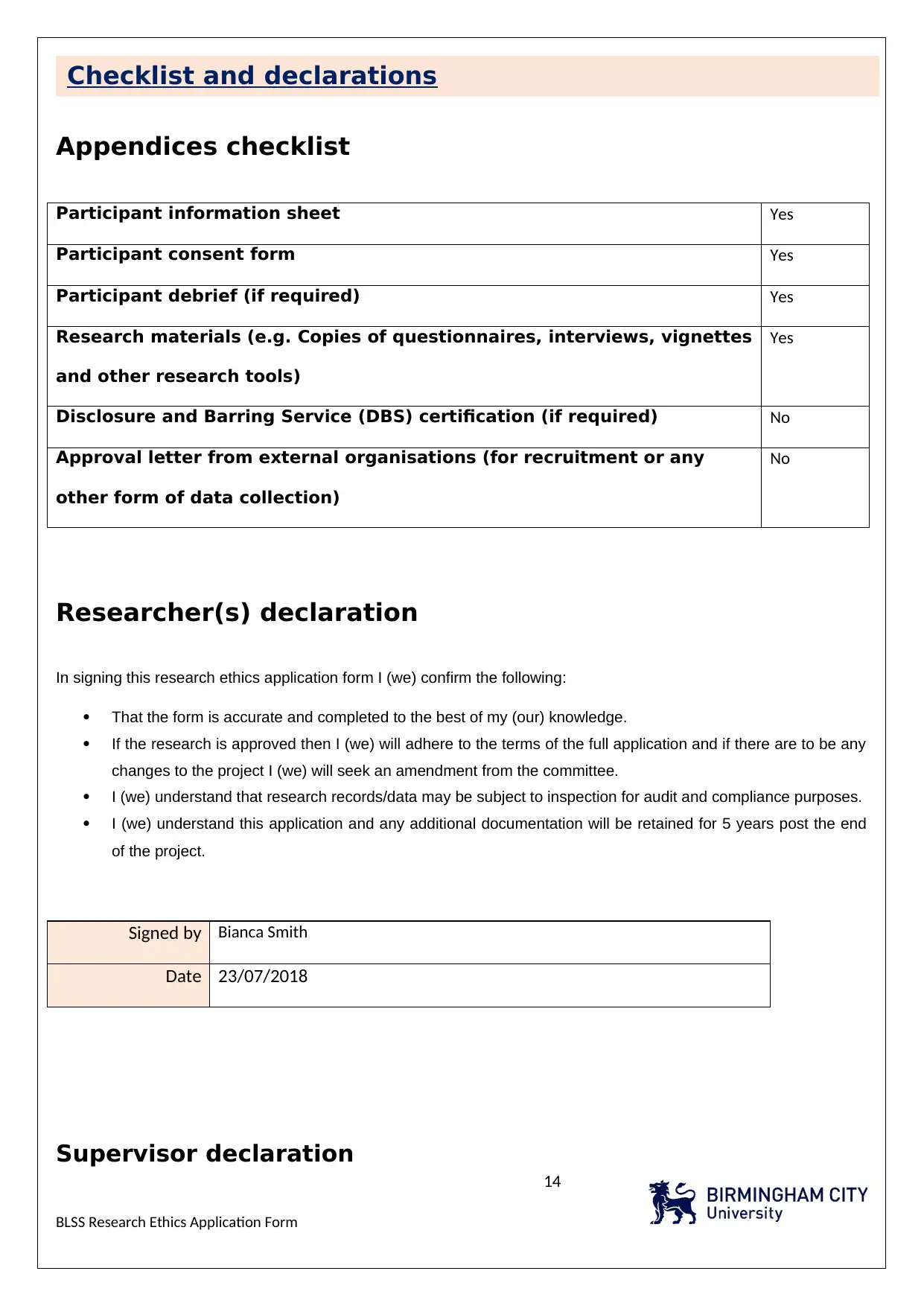
Appendices checklist
Participant information sheet Yes
Participant consent form Yes
Participant debrief (if required) Yes
Research materials (e.g. Copies of questionnaires, interviews, vignettes
and other research tools)
Yes
Disclosure and Barring Service (DBS) certification (if required) No
Approval letter from external organisations (for recruitment or any
other form of data collection)
No
Researcher(s) declaration
In signing this research ethics application form I (we) confirm the following:
That the form is accurate and completed to the best of my (our) knowledge.
If the research is approved then I (we) will adhere to the terms of the full application and if there are to be any
changes to the project I (we) will seek an amendment from the committee.
I (we) understand that research records/data may be subject to inspection for audit and compliance purposes.
I (we) understand this application and any additional documentation will be retained for 5 years post the end
of the project.
Signed by Bianca Smith
Date 23/07/2018
Supervisor declaration
14
BLSS Research Ethics Application Form
Checklist and declarations
Participant information sheet Yes
Participant consent form Yes
Participant debrief (if required) Yes
Research materials (e.g. Copies of questionnaires, interviews, vignettes
and other research tools)
Yes
Disclosure and Barring Service (DBS) certification (if required) No
Approval letter from external organisations (for recruitment or any
other form of data collection)
No
Researcher(s) declaration
In signing this research ethics application form I (we) confirm the following:
That the form is accurate and completed to the best of my (our) knowledge.
If the research is approved then I (we) will adhere to the terms of the full application and if there are to be any
changes to the project I (we) will seek an amendment from the committee.
I (we) understand that research records/data may be subject to inspection for audit and compliance purposes.
I (we) understand this application and any additional documentation will be retained for 5 years post the end
of the project.
Signed by Bianca Smith
Date 23/07/2018
Supervisor declaration
14
BLSS Research Ethics Application Form
Checklist and declarations
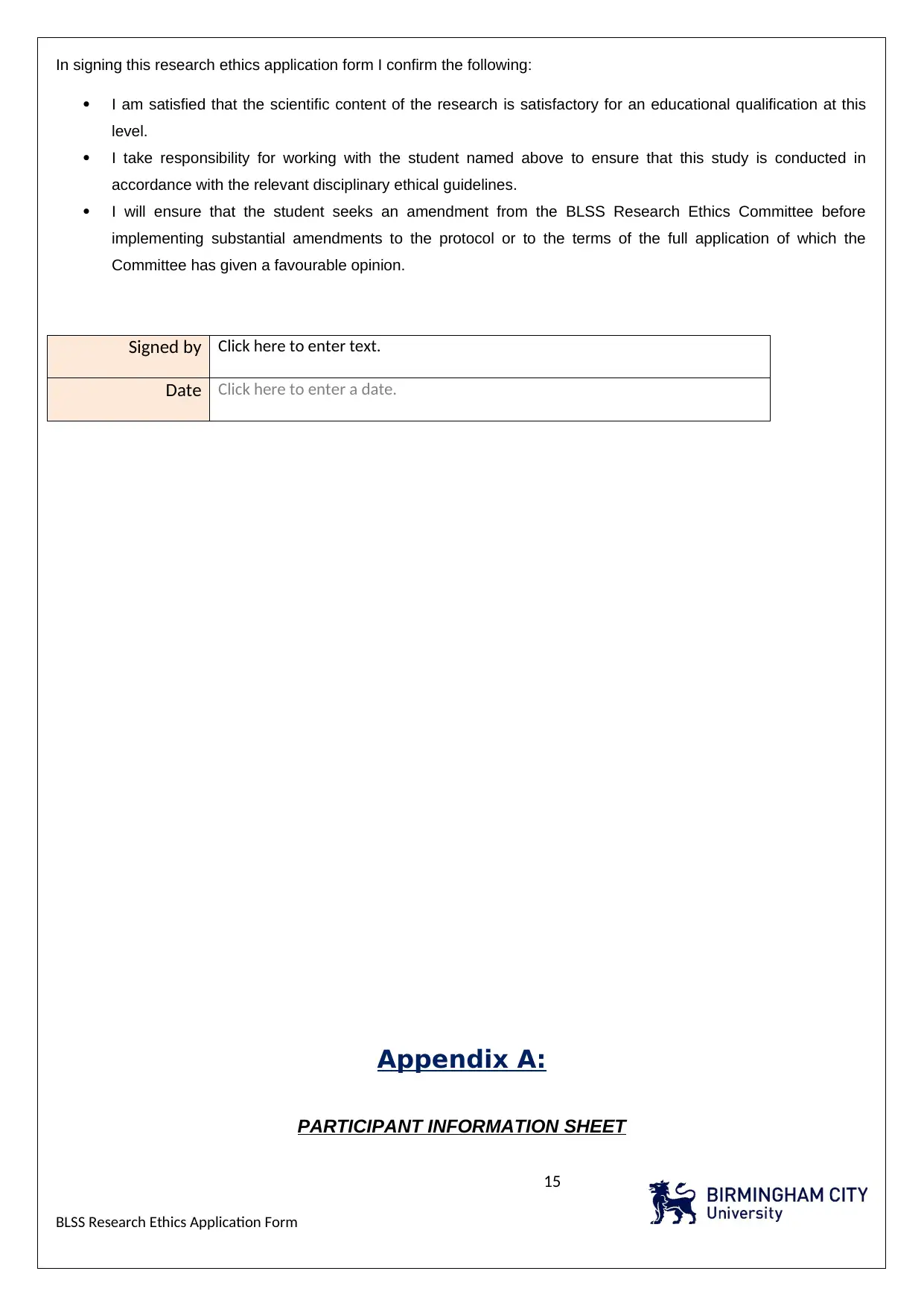
In signing this research ethics application form I confirm the following:
I am satisfied that the scientific content of the research is satisfactory for an educational qualification at this
level.
I take responsibility for working with the student named above to ensure that this study is conducted in
accordance with the relevant disciplinary ethical guidelines.
I will ensure that the student seeks an amendment from the BLSS Research Ethics Committee before
implementing substantial amendments to the protocol or to the terms of the full application of which the
Committee has given a favourable opinion.
Signed by Click here to enter text.
Date Click here to enter a date.
Appendix A:
PARTICIPANT INFORMATION SHEET
15
BLSS Research Ethics Application Form
I am satisfied that the scientific content of the research is satisfactory for an educational qualification at this
level.
I take responsibility for working with the student named above to ensure that this study is conducted in
accordance with the relevant disciplinary ethical guidelines.
I will ensure that the student seeks an amendment from the BLSS Research Ethics Committee before
implementing substantial amendments to the protocol or to the terms of the full application of which the
Committee has given a favourable opinion.
Signed by Click here to enter text.
Date Click here to enter a date.
Appendix A:
PARTICIPANT INFORMATION SHEET
15
BLSS Research Ethics Application Form
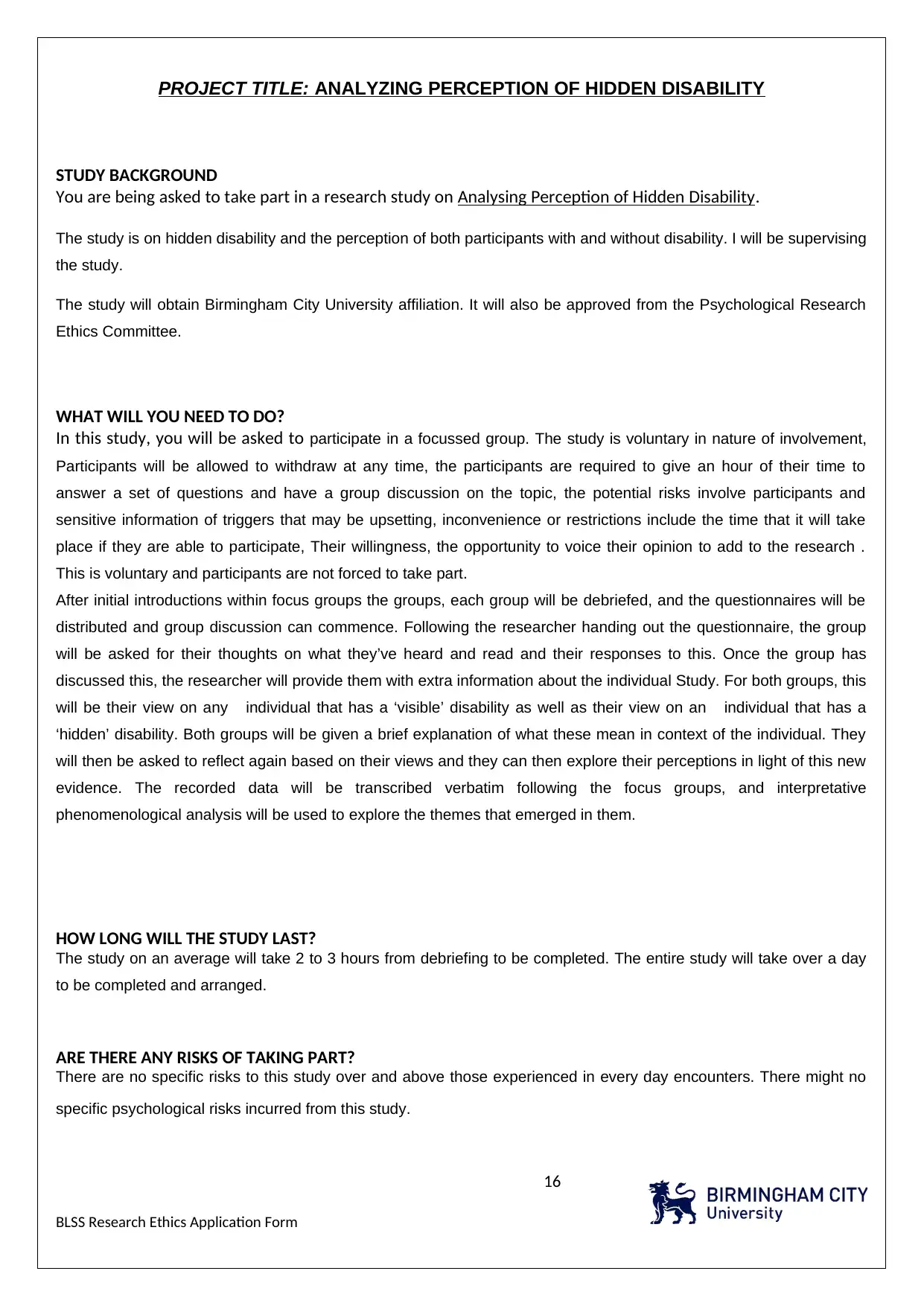
PROJECT TITLE: ANALYZING PERCEPTION OF HIDDEN DISABILITY
STUDY BACKGROUND
You are being asked to take part in a research study on Analysing Perception of Hidden Disability.
The study is on hidden disability and the perception of both participants with and without disability. I will be supervising
the study.
The study will obtain Birmingham City University affiliation. It will also be approved from the Psychological Research
Ethics Committee.
WHAT WILL YOU NEED TO DO?
In this study, you will be asked to participate in a focussed group. The study is voluntary in nature of involvement,
Participants will be allowed to withdraw at any time, the participants are required to give an hour of their time to
answer a set of questions and have a group discussion on the topic, the potential risks involve participants and
sensitive information of triggers that may be upsetting, inconvenience or restrictions include the time that it will take
place if they are able to participate, Their willingness, the opportunity to voice their opinion to add to the research .
This is voluntary and participants are not forced to take part.
After initial introductions within focus groups the groups, each group will be debriefed, and the questionnaires will be
distributed and group discussion can commence. Following the researcher handing out the questionnaire, the group
will be asked for their thoughts on what they’ve heard and read and their responses to this. Once the group has
discussed this, the researcher will provide them with extra information about the individual Study. For both groups, this
will be their view on any individual that has a ‘visible’ disability as well as their view on an individual that has a
‘hidden’ disability. Both groups will be given a brief explanation of what these mean in context of the individual. They
will then be asked to reflect again based on their views and they can then explore their perceptions in light of this new
evidence. The recorded data will be transcribed verbatim following the focus groups, and interpretative
phenomenological analysis will be used to explore the themes that emerged in them.
HOW LONG WILL THE STUDY LAST?
The study on an average will take 2 to 3 hours from debriefing to be completed. The entire study will take over a day
to be completed and arranged.
ARE THERE ANY RISKS OF TAKING PART?
There are no specific risks to this study over and above those experienced in every day encounters. There might no
specific psychological risks incurred from this study.
16
BLSS Research Ethics Application Form
STUDY BACKGROUND
You are being asked to take part in a research study on Analysing Perception of Hidden Disability.
The study is on hidden disability and the perception of both participants with and without disability. I will be supervising
the study.
The study will obtain Birmingham City University affiliation. It will also be approved from the Psychological Research
Ethics Committee.
WHAT WILL YOU NEED TO DO?
In this study, you will be asked to participate in a focussed group. The study is voluntary in nature of involvement,
Participants will be allowed to withdraw at any time, the participants are required to give an hour of their time to
answer a set of questions and have a group discussion on the topic, the potential risks involve participants and
sensitive information of triggers that may be upsetting, inconvenience or restrictions include the time that it will take
place if they are able to participate, Their willingness, the opportunity to voice their opinion to add to the research .
This is voluntary and participants are not forced to take part.
After initial introductions within focus groups the groups, each group will be debriefed, and the questionnaires will be
distributed and group discussion can commence. Following the researcher handing out the questionnaire, the group
will be asked for their thoughts on what they’ve heard and read and their responses to this. Once the group has
discussed this, the researcher will provide them with extra information about the individual Study. For both groups, this
will be their view on any individual that has a ‘visible’ disability as well as their view on an individual that has a
‘hidden’ disability. Both groups will be given a brief explanation of what these mean in context of the individual. They
will then be asked to reflect again based on their views and they can then explore their perceptions in light of this new
evidence. The recorded data will be transcribed verbatim following the focus groups, and interpretative
phenomenological analysis will be used to explore the themes that emerged in them.
HOW LONG WILL THE STUDY LAST?
The study on an average will take 2 to 3 hours from debriefing to be completed. The entire study will take over a day
to be completed and arranged.
ARE THERE ANY RISKS OF TAKING PART?
There are no specific risks to this study over and above those experienced in every day encounters. There might no
specific psychological risks incurred from this study.
16
BLSS Research Ethics Application Form
Secure Best Marks with AI Grader
Need help grading? Try our AI Grader for instant feedback on your assignments.
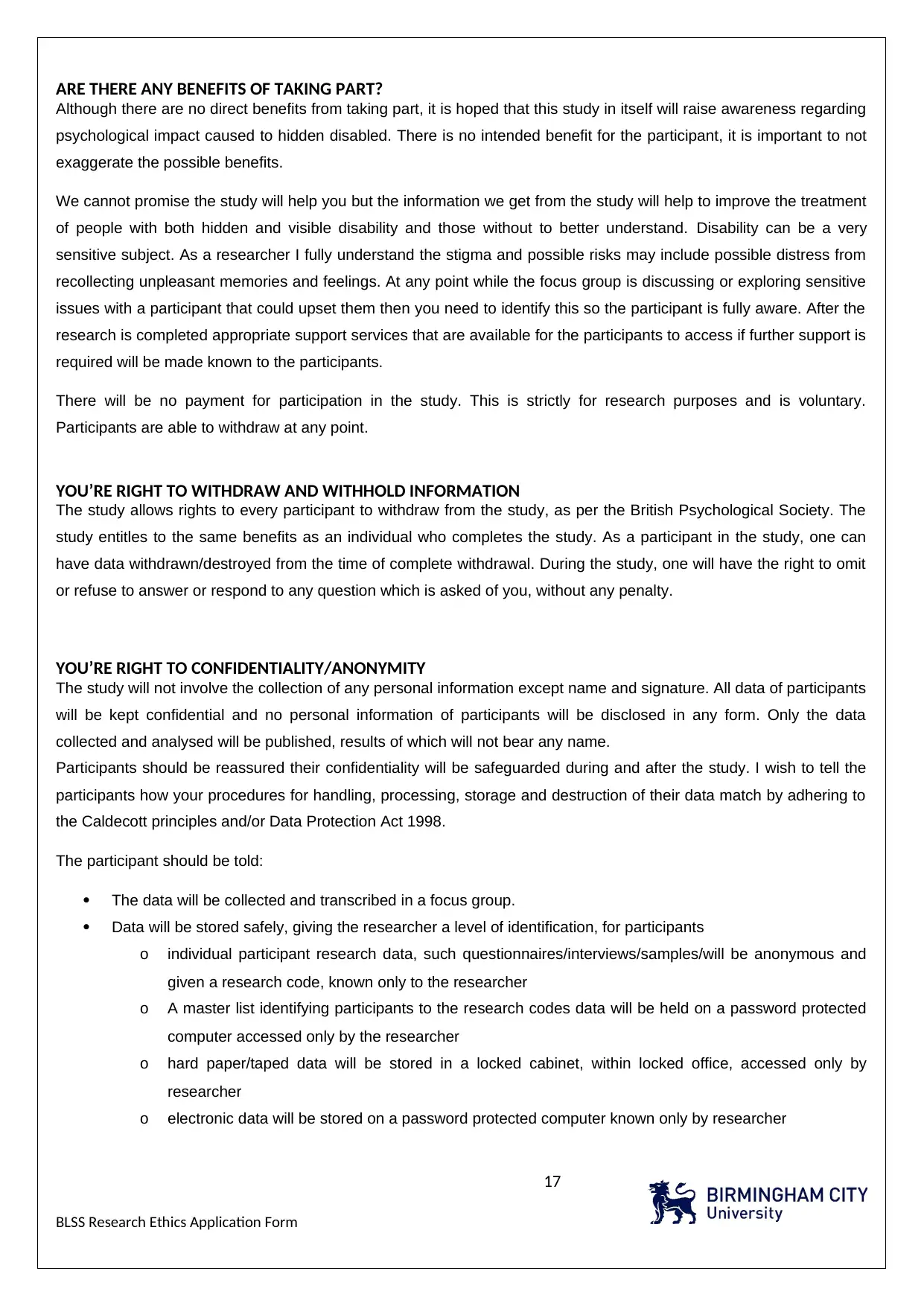
ARE THERE ANY BENEFITS OF TAKING PART?
Although there are no direct benefits from taking part, it is hoped that this study in itself will raise awareness regarding
psychological impact caused to hidden disabled. There is no intended benefit for the participant, it is important to not
exaggerate the possible benefits.
We cannot promise the study will help you but the information we get from the study will help to improve the treatment
of people with both hidden and visible disability and those without to better understand. Disability can be a very
sensitive subject. As a researcher I fully understand the stigma and possible risks may include possible distress from
recollecting unpleasant memories and feelings. At any point while the focus group is discussing or exploring sensitive
issues with a participant that could upset them then you need to identify this so the participant is fully aware. After the
research is completed appropriate support services that are available for the participants to access if further support is
required will be made known to the participants.
There will be no payment for participation in the study. This is strictly for research purposes and is voluntary.
Participants are able to withdraw at any point.
YOU’RE RIGHT TO WITHDRAW AND WITHHOLD INFORMATION
The study allows rights to every participant to withdraw from the study, as per the British Psychological Society. The
study entitles to the same benefits as an individual who completes the study. As a participant in the study, one can
have data withdrawn/destroyed from the time of complete withdrawal. During the study, one will have the right to omit
or refuse to answer or respond to any question which is asked of you, without any penalty.
YOU’RE RIGHT TO CONFIDENTIALITY/ANONYMITY
The study will not involve the collection of any personal information except name and signature. All data of participants
will be kept confidential and no personal information of participants will be disclosed in any form. Only the data
collected and analysed will be published, results of which will not bear any name.
Participants should be reassured their confidentiality will be safeguarded during and after the study. I wish to tell the
participants how your procedures for handling, processing, storage and destruction of their data match by adhering to
the Caldecott principles and/or Data Protection Act 1998.
The participant should be told:
The data will be collected and transcribed in a focus group.
Data will be stored safely, giving the researcher a level of identification, for participants
o individual participant research data, such questionnaires/interviews/samples/will be anonymous and
given a research code, known only to the researcher
o A master list identifying participants to the research codes data will be held on a password protected
computer accessed only by the researcher
o hard paper/taped data will be stored in a locked cabinet, within locked office, accessed only by
researcher
o electronic data will be stored on a password protected computer known only by researcher
17
BLSS Research Ethics Application Form
Although there are no direct benefits from taking part, it is hoped that this study in itself will raise awareness regarding
psychological impact caused to hidden disabled. There is no intended benefit for the participant, it is important to not
exaggerate the possible benefits.
We cannot promise the study will help you but the information we get from the study will help to improve the treatment
of people with both hidden and visible disability and those without to better understand. Disability can be a very
sensitive subject. As a researcher I fully understand the stigma and possible risks may include possible distress from
recollecting unpleasant memories and feelings. At any point while the focus group is discussing or exploring sensitive
issues with a participant that could upset them then you need to identify this so the participant is fully aware. After the
research is completed appropriate support services that are available for the participants to access if further support is
required will be made known to the participants.
There will be no payment for participation in the study. This is strictly for research purposes and is voluntary.
Participants are able to withdraw at any point.
YOU’RE RIGHT TO WITHDRAW AND WITHHOLD INFORMATION
The study allows rights to every participant to withdraw from the study, as per the British Psychological Society. The
study entitles to the same benefits as an individual who completes the study. As a participant in the study, one can
have data withdrawn/destroyed from the time of complete withdrawal. During the study, one will have the right to omit
or refuse to answer or respond to any question which is asked of you, without any penalty.
YOU’RE RIGHT TO CONFIDENTIALITY/ANONYMITY
The study will not involve the collection of any personal information except name and signature. All data of participants
will be kept confidential and no personal information of participants will be disclosed in any form. Only the data
collected and analysed will be published, results of which will not bear any name.
Participants should be reassured their confidentiality will be safeguarded during and after the study. I wish to tell the
participants how your procedures for handling, processing, storage and destruction of their data match by adhering to
the Caldecott principles and/or Data Protection Act 1998.
The participant should be told:
The data will be collected and transcribed in a focus group.
Data will be stored safely, giving the researcher a level of identification, for participants
o individual participant research data, such questionnaires/interviews/samples/will be anonymous and
given a research code, known only to the researcher
o A master list identifying participants to the research codes data will be held on a password protected
computer accessed only by the researcher
o hard paper/taped data will be stored in a locked cabinet, within locked office, accessed only by
researcher
o electronic data will be stored on a password protected computer known only by researcher
17
BLSS Research Ethics Application Form
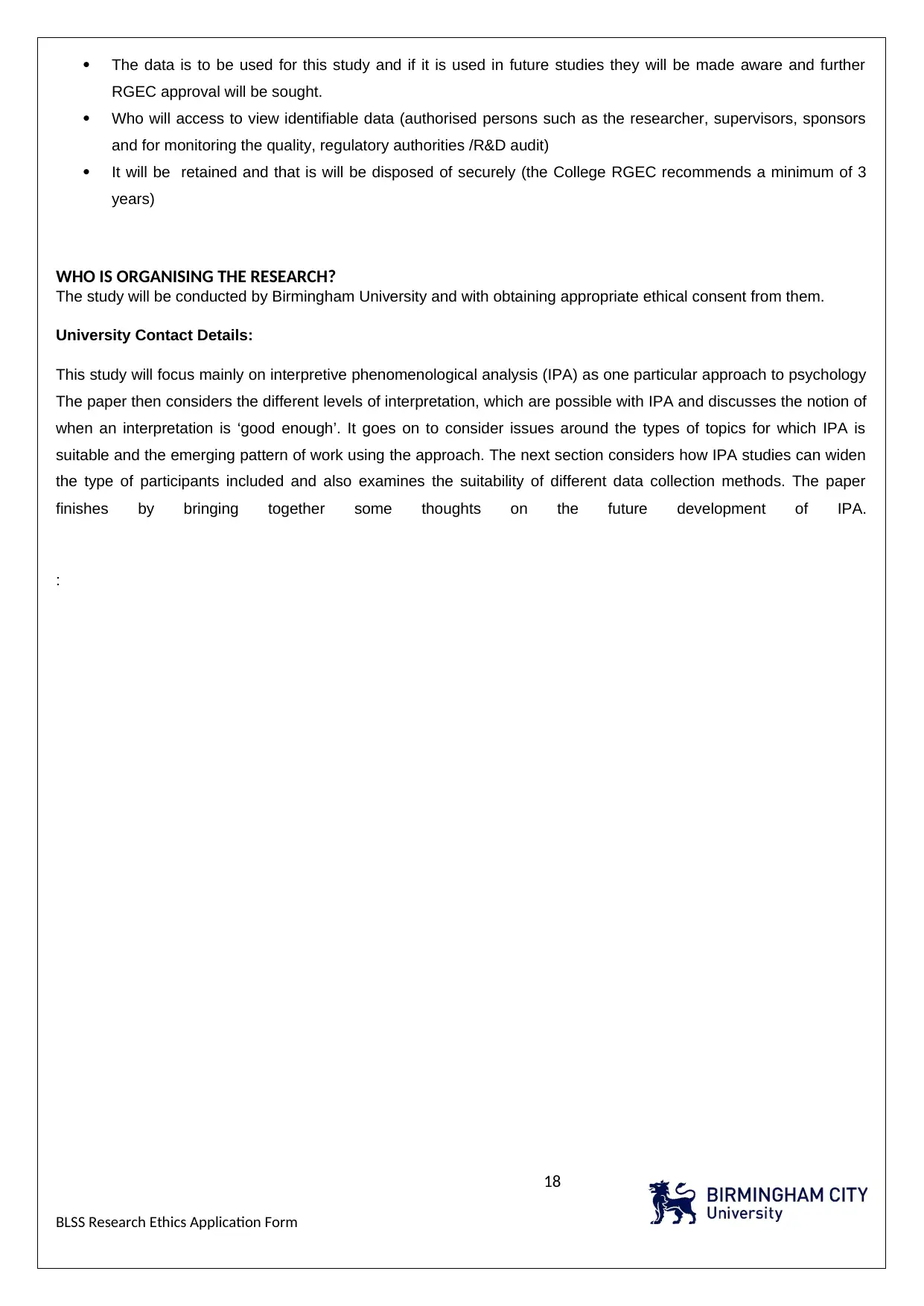
The data is to be used for this study and if it is used in future studies they will be made aware and further
RGEC approval will be sought.
Who will access to view identifiable data (authorised persons such as the researcher, supervisors, sponsors
and for monitoring the quality, regulatory authorities /R&D audit)
It will be retained and that is will be disposed of securely (the College RGEC recommends a minimum of 3
years)
WHO IS ORGANISING THE RESEARCH?
The study will be conducted by Birmingham University and with obtaining appropriate ethical consent from them.
University Contact Details:
This study will focus mainly on interpretive phenomenological analysis (IPA) as one particular approach to psychology
The paper then considers the different levels of interpretation, which are possible with IPA and discusses the notion of
when an interpretation is ‘good enough’. It goes on to consider issues around the types of topics for which IPA is
suitable and the emerging pattern of work using the approach. The next section considers how IPA studies can widen
the type of participants included and also examines the suitability of different data collection methods. The paper
finishes by bringing together some thoughts on the future development of IPA.
:
18
BLSS Research Ethics Application Form
RGEC approval will be sought.
Who will access to view identifiable data (authorised persons such as the researcher, supervisors, sponsors
and for monitoring the quality, regulatory authorities /R&D audit)
It will be retained and that is will be disposed of securely (the College RGEC recommends a minimum of 3
years)
WHO IS ORGANISING THE RESEARCH?
The study will be conducted by Birmingham University and with obtaining appropriate ethical consent from them.
University Contact Details:
This study will focus mainly on interpretive phenomenological analysis (IPA) as one particular approach to psychology
The paper then considers the different levels of interpretation, which are possible with IPA and discusses the notion of
when an interpretation is ‘good enough’. It goes on to consider issues around the types of topics for which IPA is
suitable and the emerging pattern of work using the approach. The next section considers how IPA studies can widen
the type of participants included and also examines the suitability of different data collection methods. The paper
finishes by bringing together some thoughts on the future development of IPA.
:
18
BLSS Research Ethics Application Form
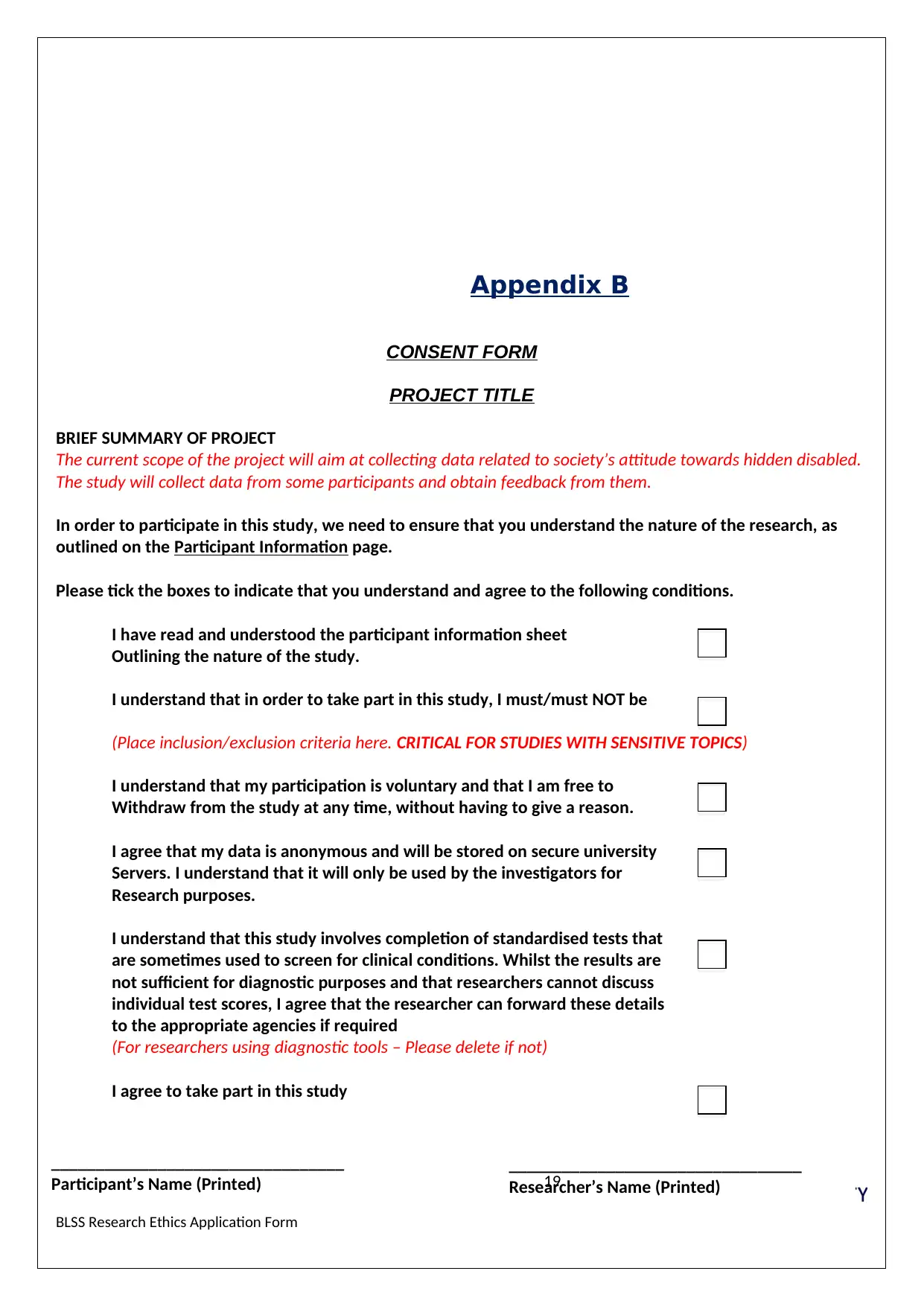
_________________________________
Participant’s Name (Printed)
_________________________________
Researcher’s Name (Printed)
Appendix B
CONSENT FORM
PROJECT TITLE
BRIEF SUMMARY OF PROJECT
The current scope of the project will aim at collecting data related to society’s attitude towards hidden disabled.
The study will collect data from some participants and obtain feedback from them.
In order to participate in this study, we need to ensure that you understand the nature of the research, as
outlined on the Participant Information page.
Please tick the boxes to indicate that you understand and agree to the following conditions.
I have read and understood the participant information sheet
Outlining the nature of the study.
I understand that in order to take part in this study, I must/must NOT be
(Place inclusion/exclusion criteria here. CRITICAL FOR STUDIES WITH SENSITIVE TOPICS)
I understand that my participation is voluntary and that I am free to
Withdraw from the study at any time, without having to give a reason.
I agree that my data is anonymous and will be stored on secure university
Servers. I understand that it will only be used by the investigators for
Research purposes.
I understand that this study involves completion of standardised tests that
are sometimes used to screen for clinical conditions. Whilst the results are
not sufficient for diagnostic purposes and that researchers cannot discuss
individual test scores, I agree that the researcher can forward these details
to the appropriate agencies if required
(For researchers using diagnostic tools – Please delete if not)
I agree to take part in this study
19
BLSS Research Ethics Application Form
Participant’s Name (Printed)
_________________________________
Researcher’s Name (Printed)
Appendix B
CONSENT FORM
PROJECT TITLE
BRIEF SUMMARY OF PROJECT
The current scope of the project will aim at collecting data related to society’s attitude towards hidden disabled.
The study will collect data from some participants and obtain feedback from them.
In order to participate in this study, we need to ensure that you understand the nature of the research, as
outlined on the Participant Information page.
Please tick the boxes to indicate that you understand and agree to the following conditions.
I have read and understood the participant information sheet
Outlining the nature of the study.
I understand that in order to take part in this study, I must/must NOT be
(Place inclusion/exclusion criteria here. CRITICAL FOR STUDIES WITH SENSITIVE TOPICS)
I understand that my participation is voluntary and that I am free to
Withdraw from the study at any time, without having to give a reason.
I agree that my data is anonymous and will be stored on secure university
Servers. I understand that it will only be used by the investigators for
Research purposes.
I understand that this study involves completion of standardised tests that
are sometimes used to screen for clinical conditions. Whilst the results are
not sufficient for diagnostic purposes and that researchers cannot discuss
individual test scores, I agree that the researcher can forward these details
to the appropriate agencies if required
(For researchers using diagnostic tools – Please delete if not)
I agree to take part in this study
19
BLSS Research Ethics Application Form
Paraphrase This Document
Need a fresh take? Get an instant paraphrase of this document with our AI Paraphraser
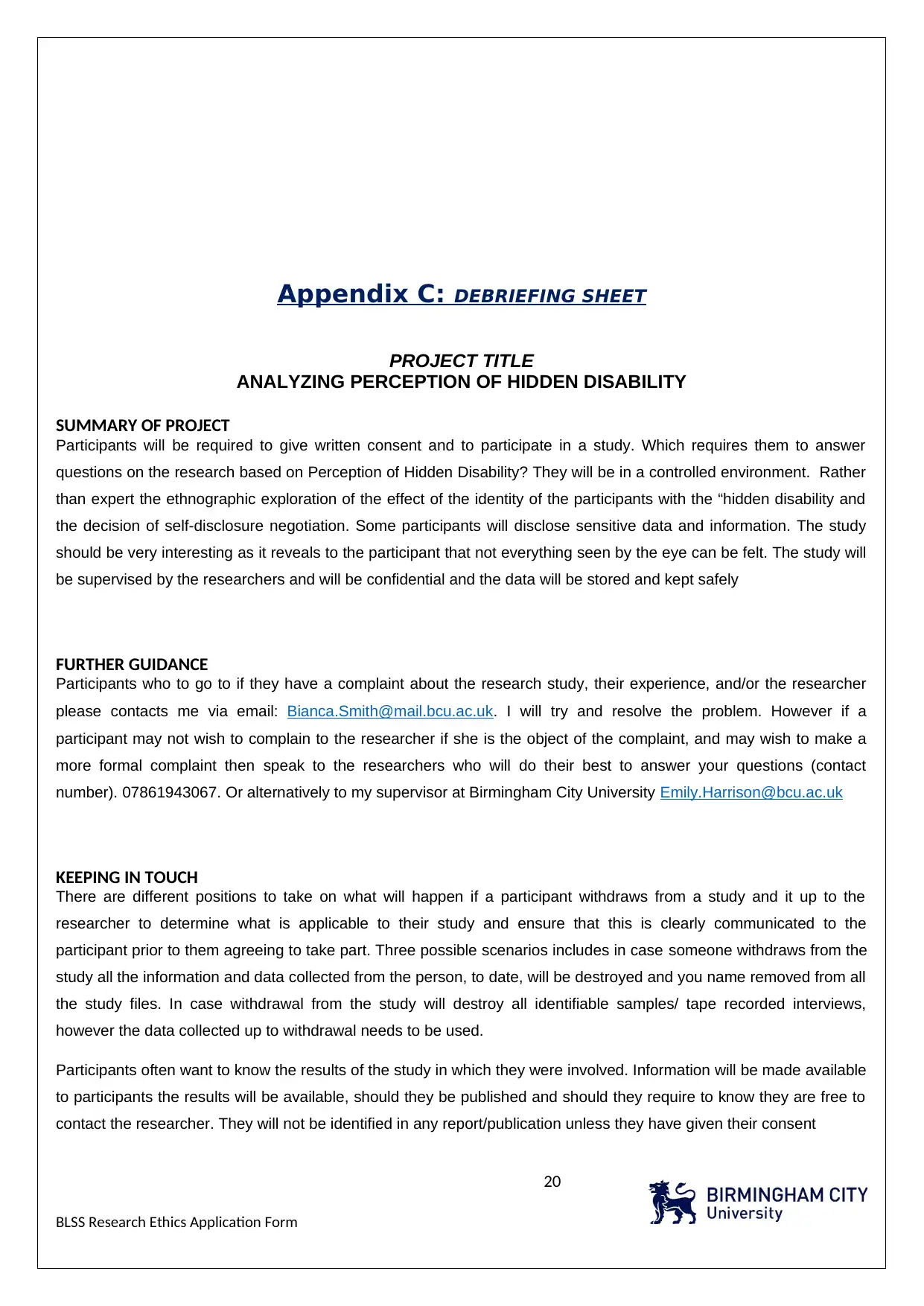
Appendix C: DEBRIEFING SHEET
PROJECT TITLE
ANALYZING PERCEPTION OF HIDDEN DISABILITY
SUMMARY OF PROJECT
Participants will be required to give written consent and to participate in a study. Which requires them to answer
questions on the research based on Perception of Hidden Disability? They will be in a controlled environment. Rather
than expert the ethnographic exploration of the effect of the identity of the participants with the “hidden disability and
the decision of self-disclosure negotiation. Some participants will disclose sensitive data and information. The study
should be very interesting as it reveals to the participant that not everything seen by the eye can be felt. The study will
be supervised by the researchers and will be confidential and the data will be stored and kept safely
FURTHER GUIDANCE
Participants who to go to if they have a complaint about the research study, their experience, and/or the researcher
please contacts me via email: Bianca.Smith@mail.bcu.ac.uk. I will try and resolve the problem. However if a
participant may not wish to complain to the researcher if she is the object of the complaint, and may wish to make a
more formal complaint then speak to the researchers who will do their best to answer your questions (contact
number). 07861943067. Or alternatively to my supervisor at Birmingham City University Emily.Harrison@bcu.ac.uk
KEEPING IN TOUCH
There are different positions to take on what will happen if a participant withdraws from a study and it up to the
researcher to determine what is applicable to their study and ensure that this is clearly communicated to the
participant prior to them agreeing to take part. Three possible scenarios includes in case someone withdraws from the
study all the information and data collected from the person, to date, will be destroyed and you name removed from all
the study files. In case withdrawal from the study will destroy all identifiable samples/ tape recorded interviews,
however the data collected up to withdrawal needs to be used.
Participants often want to know the results of the study in which they were involved. Information will be made available
to participants the results will be available, should they be published and should they require to know they are free to
contact the researcher. They will not be identified in any report/publication unless they have given their consent
20
BLSS Research Ethics Application Form
PROJECT TITLE
ANALYZING PERCEPTION OF HIDDEN DISABILITY
SUMMARY OF PROJECT
Participants will be required to give written consent and to participate in a study. Which requires them to answer
questions on the research based on Perception of Hidden Disability? They will be in a controlled environment. Rather
than expert the ethnographic exploration of the effect of the identity of the participants with the “hidden disability and
the decision of self-disclosure negotiation. Some participants will disclose sensitive data and information. The study
should be very interesting as it reveals to the participant that not everything seen by the eye can be felt. The study will
be supervised by the researchers and will be confidential and the data will be stored and kept safely
FURTHER GUIDANCE
Participants who to go to if they have a complaint about the research study, their experience, and/or the researcher
please contacts me via email: Bianca.Smith@mail.bcu.ac.uk. I will try and resolve the problem. However if a
participant may not wish to complain to the researcher if she is the object of the complaint, and may wish to make a
more formal complaint then speak to the researchers who will do their best to answer your questions (contact
number). 07861943067. Or alternatively to my supervisor at Birmingham City University Emily.Harrison@bcu.ac.uk
KEEPING IN TOUCH
There are different positions to take on what will happen if a participant withdraws from a study and it up to the
researcher to determine what is applicable to their study and ensure that this is clearly communicated to the
participant prior to them agreeing to take part. Three possible scenarios includes in case someone withdraws from the
study all the information and data collected from the person, to date, will be destroyed and you name removed from all
the study files. In case withdrawal from the study will destroy all identifiable samples/ tape recorded interviews,
however the data collected up to withdrawal needs to be used.
Participants often want to know the results of the study in which they were involved. Information will be made available
to participants the results will be available, should they be published and should they require to know they are free to
contact the researcher. They will not be identified in any report/publication unless they have given their consent
20
BLSS Research Ethics Application Form
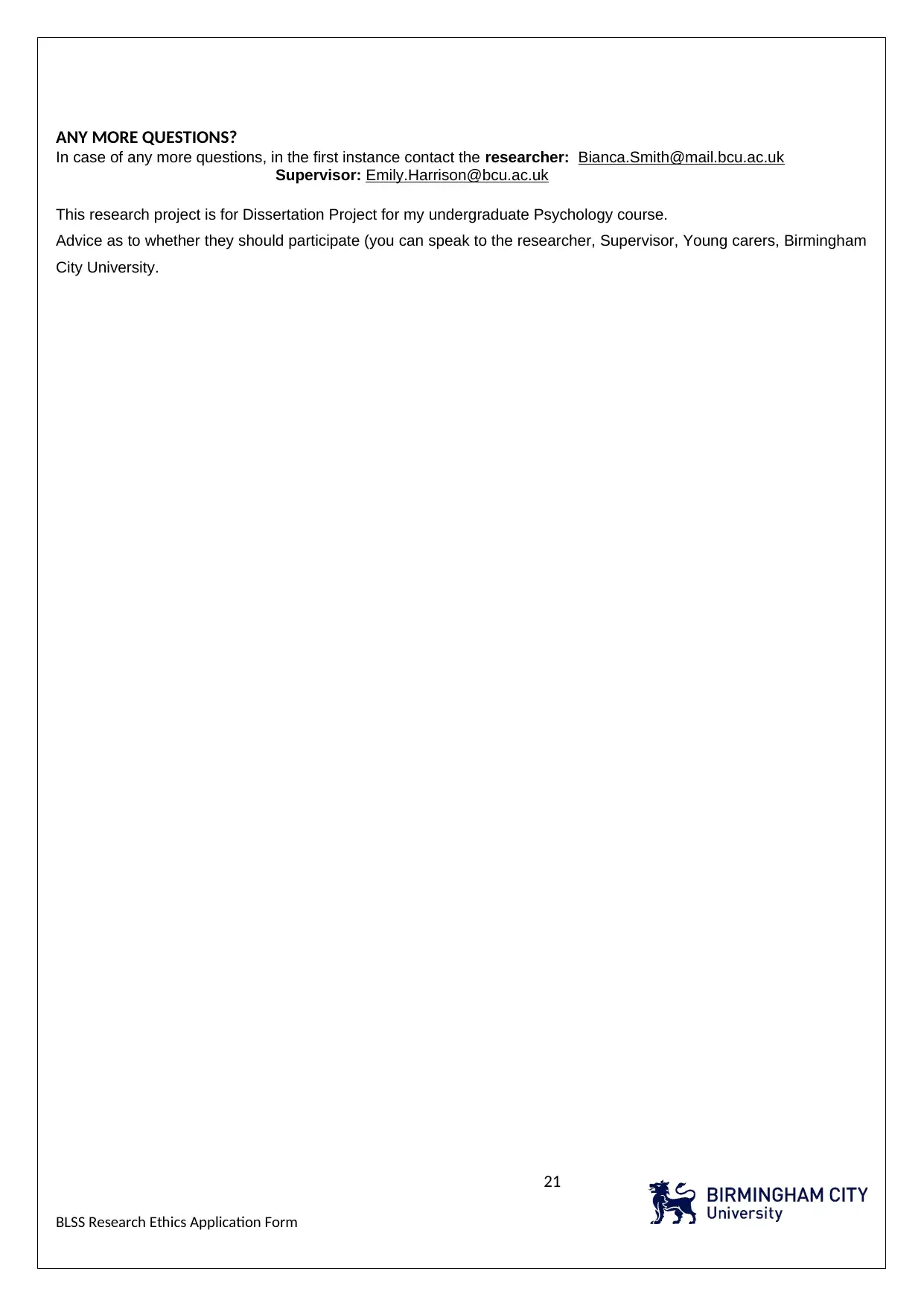
ANY MORE QUESTIONS?
In case of any more questions, in the first instance contact the researcher: Bianca.Smith@mail.bcu.ac.uk
Supervisor: Emily.Harrison@bcu.ac.uk
This research project is for Dissertation Project for my undergraduate Psychology course.
Advice as to whether they should participate (you can speak to the researcher, Supervisor, Young carers, Birmingham
City University.
21
BLSS Research Ethics Application Form
In case of any more questions, in the first instance contact the researcher: Bianca.Smith@mail.bcu.ac.uk
Supervisor: Emily.Harrison@bcu.ac.uk
This research project is for Dissertation Project for my undergraduate Psychology course.
Advice as to whether they should participate (you can speak to the researcher, Supervisor, Young carers, Birmingham
City University.
21
BLSS Research Ethics Application Form
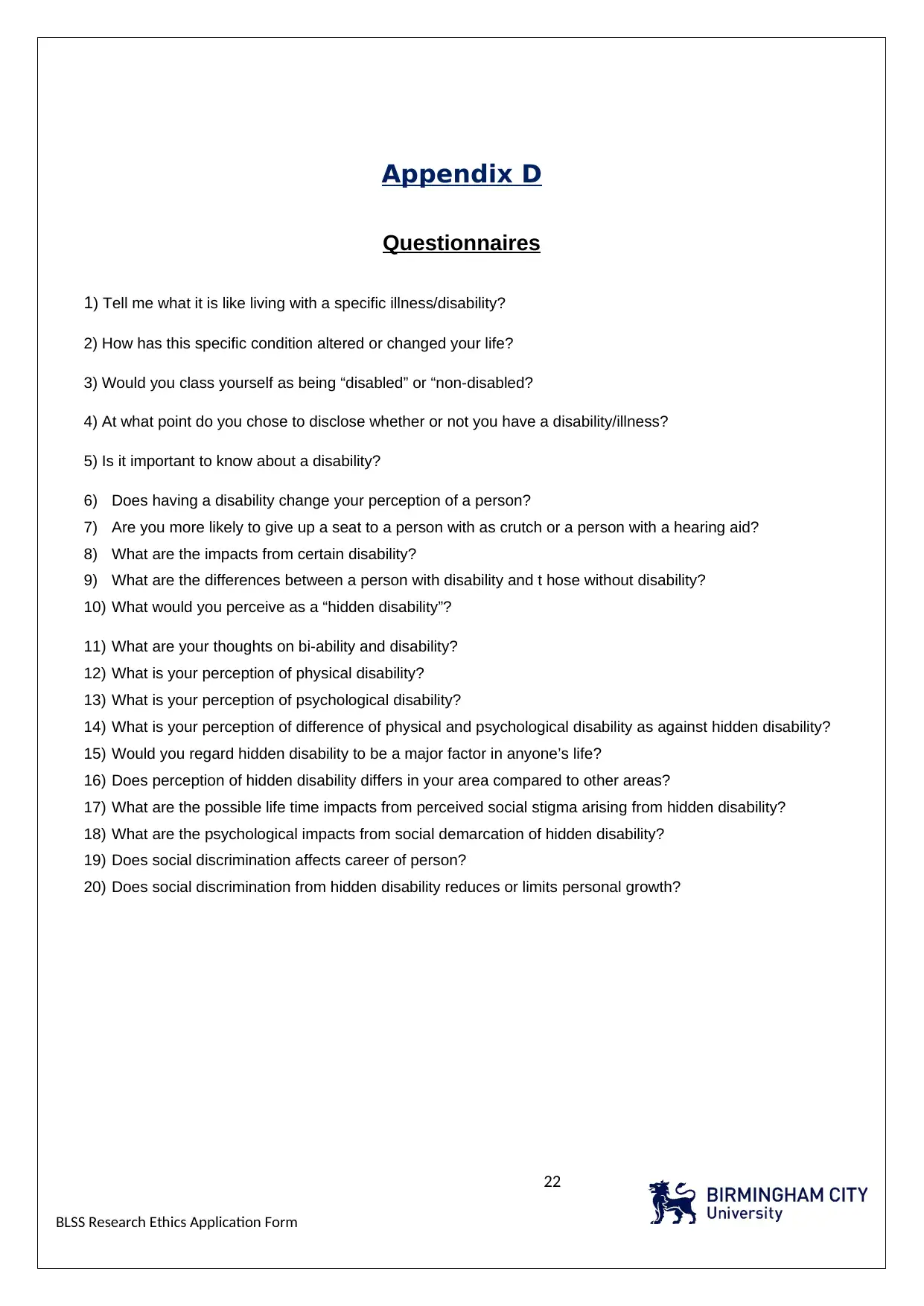
Appendix D
Questionnaires
1) Tell me what it is like living with a specific illness/disability?
2) How has this specific condition altered or changed your life?
3) Would you class yourself as being “disabled” or “non-disabled?
4) At what point do you chose to disclose whether or not you have a disability/illness?
5) Is it important to know about a disability?
6) Does having a disability change your perception of a person?
7) Are you more likely to give up a seat to a person with as crutch or a person with a hearing aid?
8) What are the impacts from certain disability?
9) What are the differences between a person with disability and t hose without disability?
10) What would you perceive as a “hidden disability”?
11) What are your thoughts on bi-ability and disability?
12) What is your perception of physical disability?
13) What is your perception of psychological disability?
14) What is your perception of difference of physical and psychological disability as against hidden disability?
15) Would you regard hidden disability to be a major factor in anyone’s life?
16) Does perception of hidden disability differs in your area compared to other areas?
17) What are the possible life time impacts from perceived social stigma arising from hidden disability?
18) What are the psychological impacts from social demarcation of hidden disability?
19) Does social discrimination affects career of person?
20) Does social discrimination from hidden disability reduces or limits personal growth?
22
BLSS Research Ethics Application Form
Questionnaires
1) Tell me what it is like living with a specific illness/disability?
2) How has this specific condition altered or changed your life?
3) Would you class yourself as being “disabled” or “non-disabled?
4) At what point do you chose to disclose whether or not you have a disability/illness?
5) Is it important to know about a disability?
6) Does having a disability change your perception of a person?
7) Are you more likely to give up a seat to a person with as crutch or a person with a hearing aid?
8) What are the impacts from certain disability?
9) What are the differences between a person with disability and t hose without disability?
10) What would you perceive as a “hidden disability”?
11) What are your thoughts on bi-ability and disability?
12) What is your perception of physical disability?
13) What is your perception of psychological disability?
14) What is your perception of difference of physical and psychological disability as against hidden disability?
15) Would you regard hidden disability to be a major factor in anyone’s life?
16) Does perception of hidden disability differs in your area compared to other areas?
17) What are the possible life time impacts from perceived social stigma arising from hidden disability?
18) What are the psychological impacts from social demarcation of hidden disability?
19) Does social discrimination affects career of person?
20) Does social discrimination from hidden disability reduces or limits personal growth?
22
BLSS Research Ethics Application Form
1 out of 22
Related Documents
Your All-in-One AI-Powered Toolkit for Academic Success.
+13062052269
info@desklib.com
Available 24*7 on WhatsApp / Email
![[object Object]](/_next/static/media/star-bottom.7253800d.svg)
Unlock your academic potential
© 2024 | Zucol Services PVT LTD | All rights reserved.





